'It's here! Romani sexual dissidence'
The chapters
An exploration of history, identity, reclaiming the word ‘Gypsy’ and Romani sexual dissidence.
- 01
Introduction
An introduction – history, identity, reclaiming the word Gypsy and Romani sexual dissidence by Emma Eastwood Taken from an interview with Iñaki Vázquez Arencón, from Plataforma Khetane and Ververipen. A history of persecution “The…
7 min read
- 02
Fakali: Feminist Gitano Voices
Ensuring that Roma women are heard – an interview with Fakali by Emma Eastwood My name is Sandra Heredia. I’m 33 years old and from Córdoba. I’m responsible for international, national and EU relations at the Federación de…
11 min read
- 03
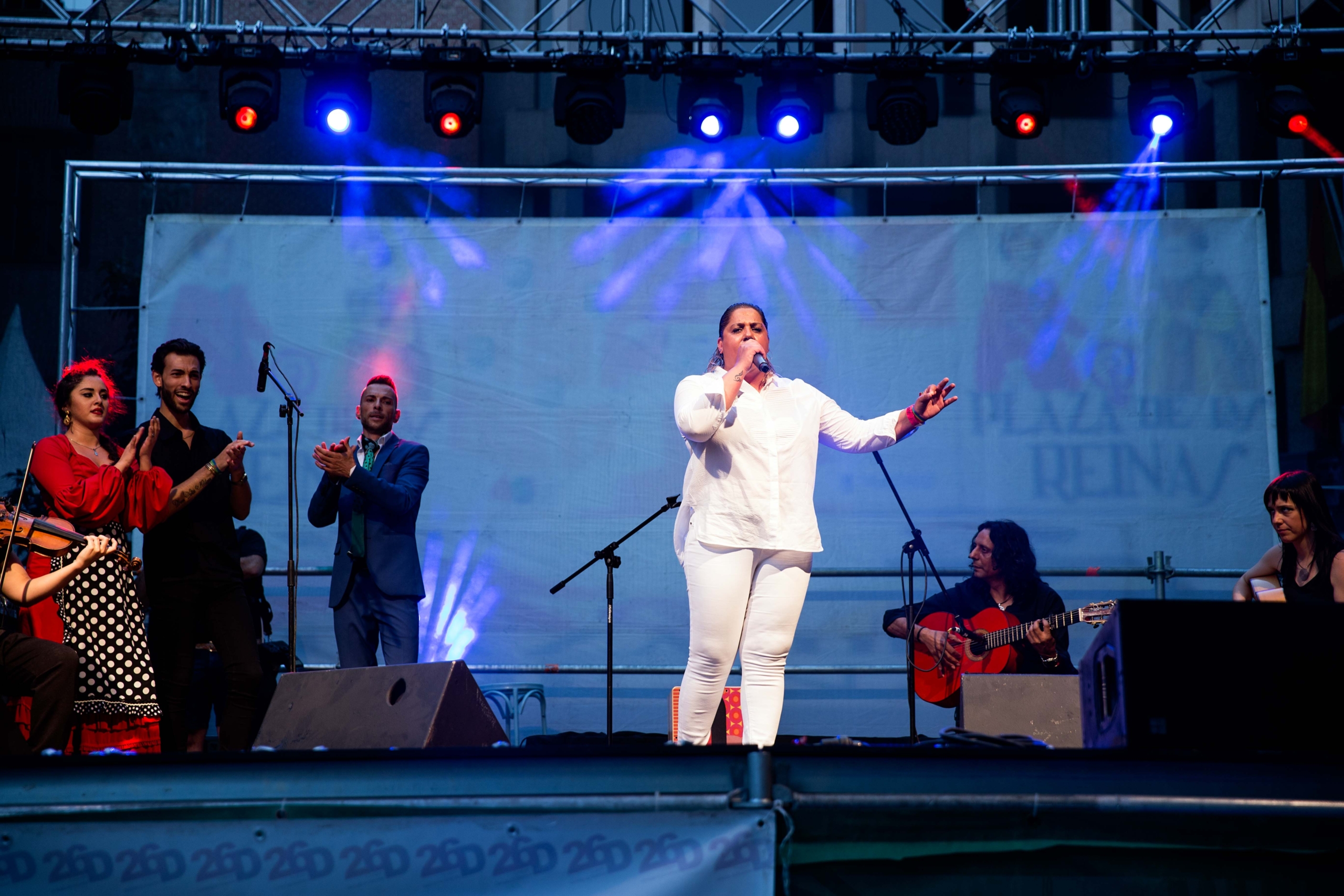
Photo story: La Negri
Photo story: La Negri Photographer Bex Wade writes about seeing one of the community’s key role models perform at Madrid Pride. After spending time being immersed in the warmth and community of the Gypsy sexual dissidents, it seemed only…
2 min read
- 04
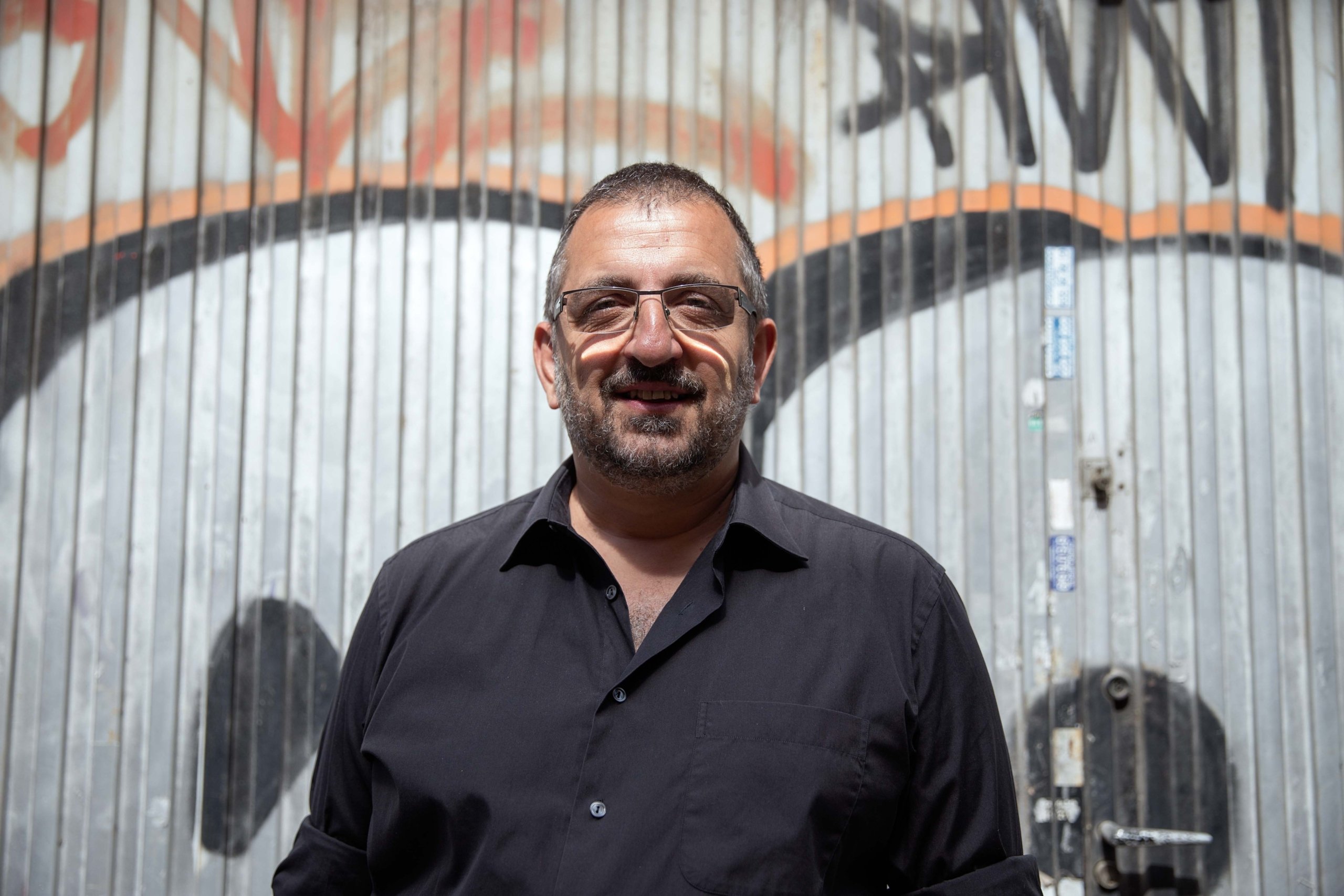
Being a Sexual Dissident
An interview with Iñaki – on being a Romani sexual dissident by Emma Eastwood My name is Iñaki Vazquez, I’m 50 years old. I identify as a Gypsy, and as a marica (queer). I say queer intentionally because for me reclaiming that word is…
6 min read
- 05
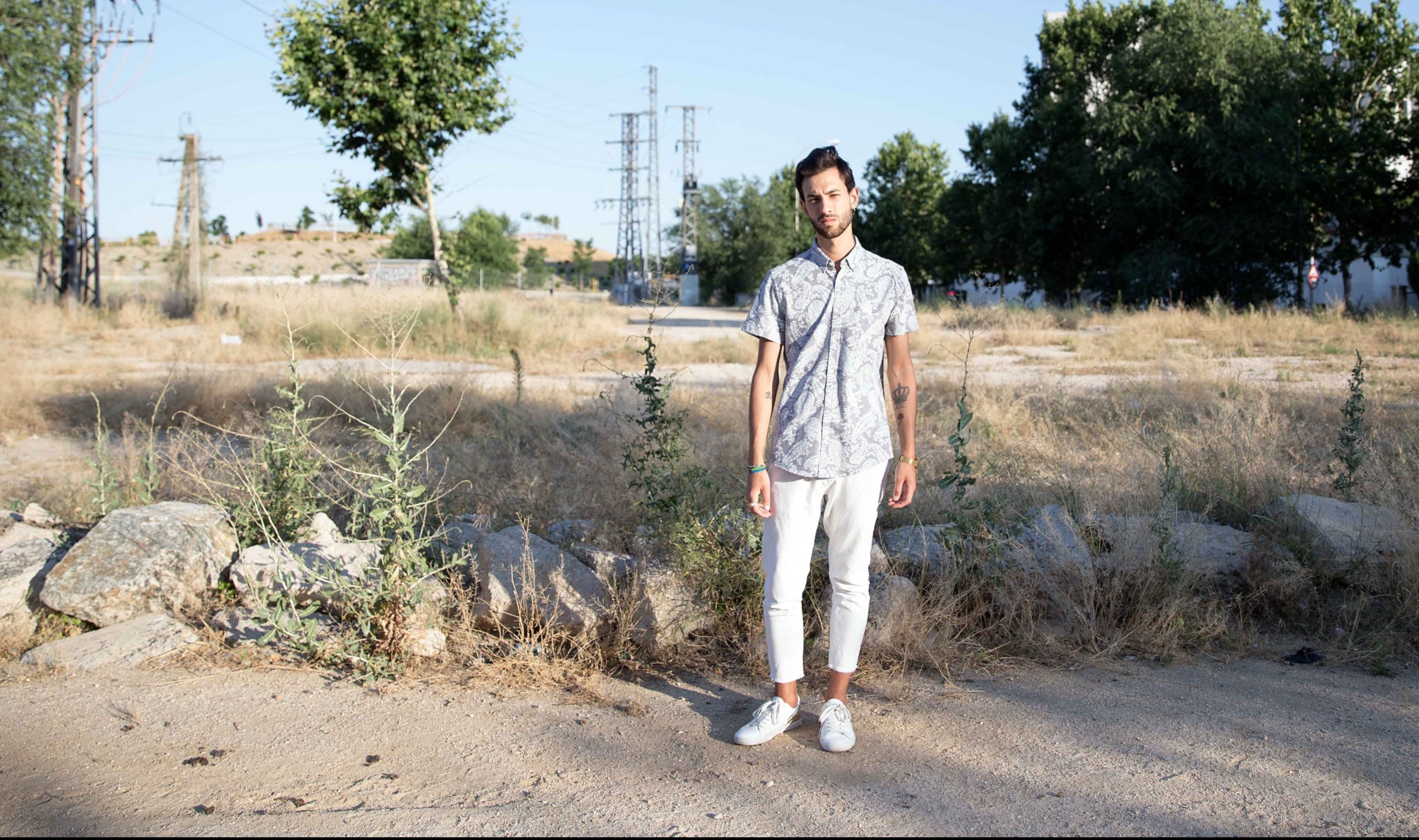
Dani Speaks
An interview with Dani – on diversity, dismantling stereotypes and the Gypsy matriarchy by Emma Eastwood My name is Daniel Janoher de Vargas. I’m 21 years old, and was born in Hortaleza, Madrid. My family is of mixed ethnicity. My father…
4 min read
- 06
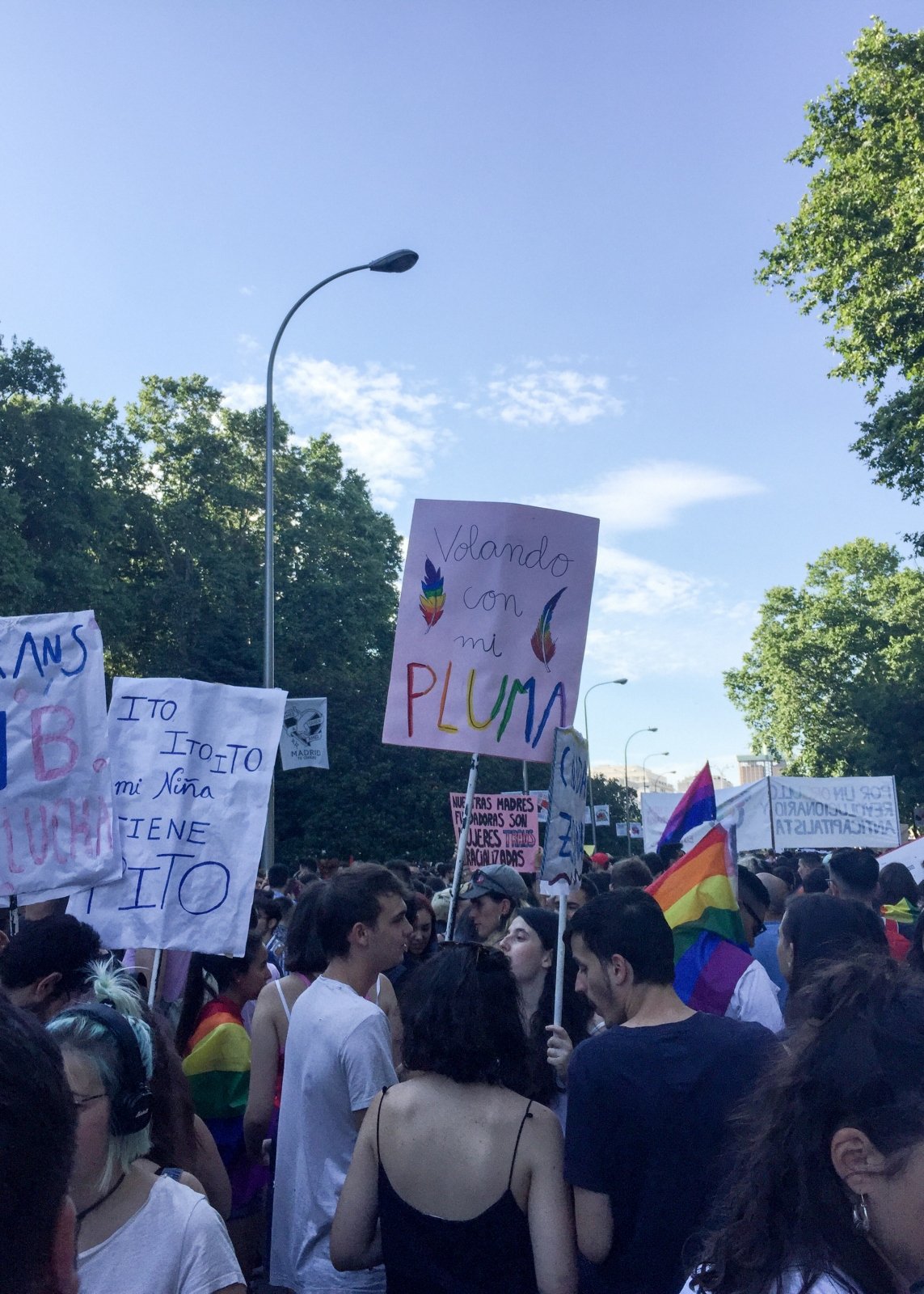
Critical Pride
Madrid’s Critical Pride protest – ‘Pride is transgression’ by Emma Eastwood Madrid’s Critical Pride (Orgullo Crítico), is a series of events centred around a large demonstration held on 28 June, under the motto ‘Pride is…
5 min read
-
An introduction – history, identity, reclaiming the word Gypsy and Romani sexual dissidence
by Emma Eastwood
Taken from an interview with Iñaki Vázquez Arencón, from Plataforma Khetane and Ververipen.
A history of persecution
“The first Gypsies to arrive in Spain in the early 15th Century were the Calé, which means los negros (blacks) in the Romani language. At that time, it seems that they were welcomed and given safe passage by the rulers of the separate kingdoms which existed on the Iberian Peninsula before the Spanish crowns were unified. Calé were people that came from the East, who were seen as exotic by the Europeans. They were well-dressed and relatively wealthy and presented an opportunity for cultural exchange and learning.
However, with the marriage of the Catholic Monarchs Ferdinand and Isabella in 1469, which led to the unification of the Spanish crowns, persecution of Gypsies began in earnest. The Catholic Monarchs had an overt political, military and economic project to unite all of the kingdoms. As far as I’m concerned, they also had an explicit agenda in terms of ethnic supremacy, and for this reason when they consolidated their power and began the construction of what is now the modern state of Spain, everything changed for Gypsy people.
In 1499, the Catholic Monarchs enacted the first law against Gypsies. Throughout our time here in Spain there have been more than 2000 anti-Gypsy laws. Since we moved from a dictatorship to a democracy in the mid 1970s, these laws ceased to exist, but societal discrimination still persists.
Just consider… The Jewish community was expelled after having been here for centuries. The Moors were also expelled or assimilated, and then they tried to do the same with the Gypsies….they were trying to rid Spain of otherness and construct a hegemonic identity. This reached a peak almost 300 years later, when there was an attempt at complete extermination of Gypsies known as La Gran Redada (The Great Gypsy Round-up) in 1749. A large part of the community was annihilated, and at the same time a significant part of our collective memory was also erased.”
Identity and majority values
In my opinion, this in part explains why the Gypsy community in Spain is where it is now. One dominant group has exerted social, cultural, political and economic influence over all others for almost 600 years and has projected all of its ills on to those members of society who are perceived to be different. As Gypsies were the only minorities left in Spain for many centuries, we bore the brunt of this process.’
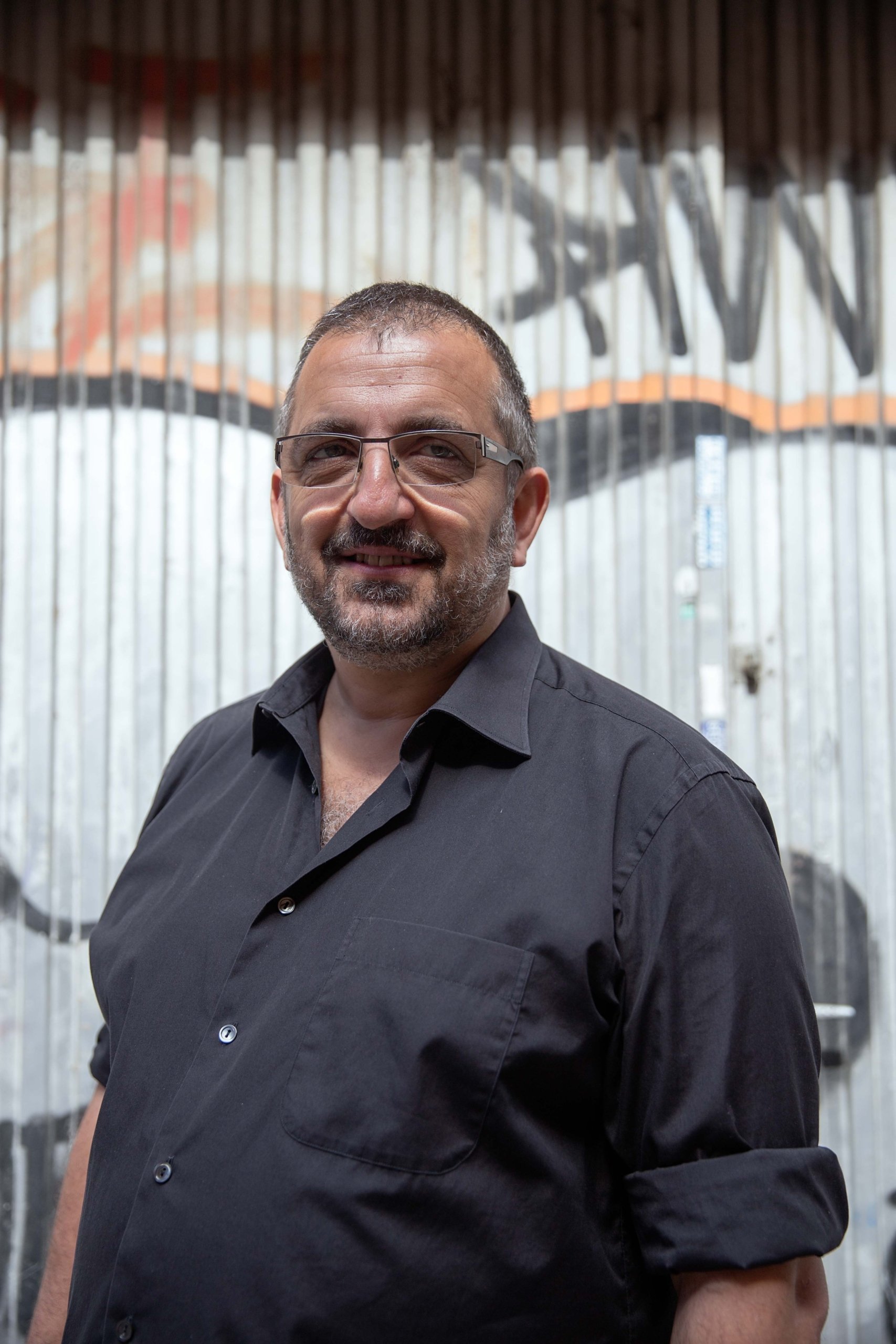
Iñaki Vázquez Arencón, from Plataforma Khetane and Ververipen. Photo by Bex Wade Our identity has only been preserved by our own sheer will, despite the oppression which began with the Catholic Monarchs and has continued until the present day. This anti-Gypsyism and our struggle against it is also perhaps what joins us together as a people. It’s strange because we’ve been here for 600 years, we’re fully European, and yet our oppression has always been accompanied by accusations of being outsiders.
I think many Spanish people have always felt close to Gypsies in terms of culture and identity. In fact, Spain has appropriated Gypsy culture and made it its own. However, as I said before, the construction of Spanish identity has always been directly related to the obliteration of difference. For instance, the Gypsy origins of flamenco are often negated. For us flamenco is so important. I always liken it to the significance of blues music in the USA for African-Americans. It embodies the suffering of our people; it’s a cry of pain, but it’s also a way of overcoming pain. Flamenco is our own unique way of expressing ourselves. But the public image of Spain in many parts of the world is flamenco. It has even been awarded World Heritage status, yet in a statement from the Spanish government welcoming UNESCO’s decision, they never once mentioned flamenco’s Gypsy origins. There’s even a movement in Spain to reassign flamenco as property of the Gypsy community.”
Reappropriation of the word Gypsy
‘We have customs which are different from other Romani peoples around the world. At a meeting in 1971 in London where the Romani flag and anthem were agreed, we very much felt part of the global Romani family, but still conserve our own culture as Calé’.
In Spain we call ourselves gitanos or Gypsies and we when we say Roma we mean Romani people that come from the rest of Europe. But, of course, we are all Romani and what joins us together is our shared identity. It’s a little confusing!

Roma flag, Photo by Bex Wade Colloquially we call ourselves gitanos or Gypsies. Curiously in Spain we have reclaimed and taken the name that they once used as an insult against us. It comes from the word Egyptians, which is what they called us when we first arrived as supposedly we came from Little Egypt, where Greece is nowadays. The word Gypsy is still pejorative in the rest of Europe, but in Spain we have reconceptualised it and made it our own. In fact, when we get together with the rest of our Romani cousins in Europe, and we say, “We are Gypsies,” they often come back with, “What are you saying!”
We do, in my opinion, have problems of political cohesion. Gypsy people in Spain definitely want to continue being called Gypsies. However, I’m not sure if all of the Spanish Gypsy organisations feel that we all belong to the same global Romani community. I think it’s really important. One of our strengths is that we are a transnational movement and we should break down the barriers that borders represent, especially as they are artificial frontiers that modern Western states have imposed on us.”
Romani sexual dissidence
‘During the last decades in Europe there has been legislative reform to recognise the rights of lesbians, gays, bisexuals and trans (LGBT) people. In a way the recognition of the rights of LGBT people has been established as one of the core values of the West. But all of this has happened within the norms of the system, including in terms of class and ethnicity.’
For example, we are here in Madrid. Madrid is known as one of the LGBT capitals of Europe, with one of the largest Pride celebrations. But Pride does not represent the sexual diversity of the minority and migrant communities who live in Madrid. Pride should be anti-racist or just shouldn’t exist at all. And it most certainly shouldn’t be commercialised. For instance, Chueca, which is known as the gay neighbourhood, isn’t very accepting of ethnic minorities. I’d even say it’s quite a racist neighbourhood. There is also a class component. Poor people can’t afford to go out in Chueca as it’s simply too pricey.
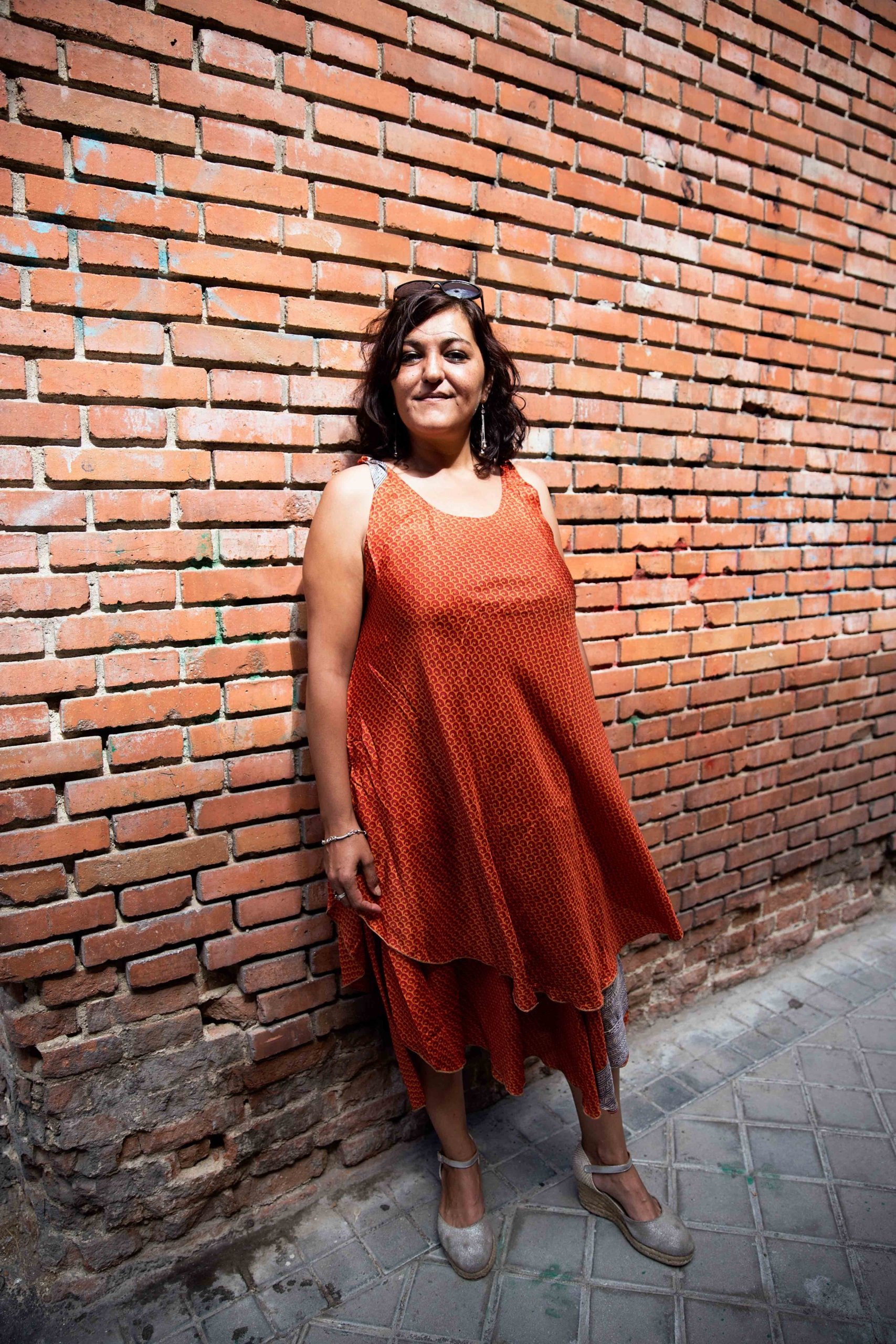
Celia Montoya from Ververipen. Photo by Bex Wade So, the imposition of a certain kind of gay culture excludes ethnic minorities who are sexually diverse. We count ourselves amongst the latter. Mainstream gay culture doesn’t represent us. As a result, for a number of years now we have been using the phrase ‘sexual dissidence’ as it includes so much more than the LGBT acronym. It directly confronts the regulation of the LGBT space by the heteropatriarchal system. For example, there are so many rainbow flags on the balconies of Madrid at the moment, but I’m not sure if those same people speak out when there are attacks on immigrant trans people, which are really frequent at the moment.
There are many Gypsies in Spain who are sexual dissidents, who are gender and sex diverse, but who do not call themselves lesbians, gays or bisexuals. It’s a definition and terminology that our community doesn’t necessarily relate to. I’ve been an LGBT activist for years, and in many ways the struggle for the enjoyment of our bodies has been centred around deconstructing the institution of the family, which is seen as one of our main oppressors. Of course, I understand and share the concern, but there are specificities.
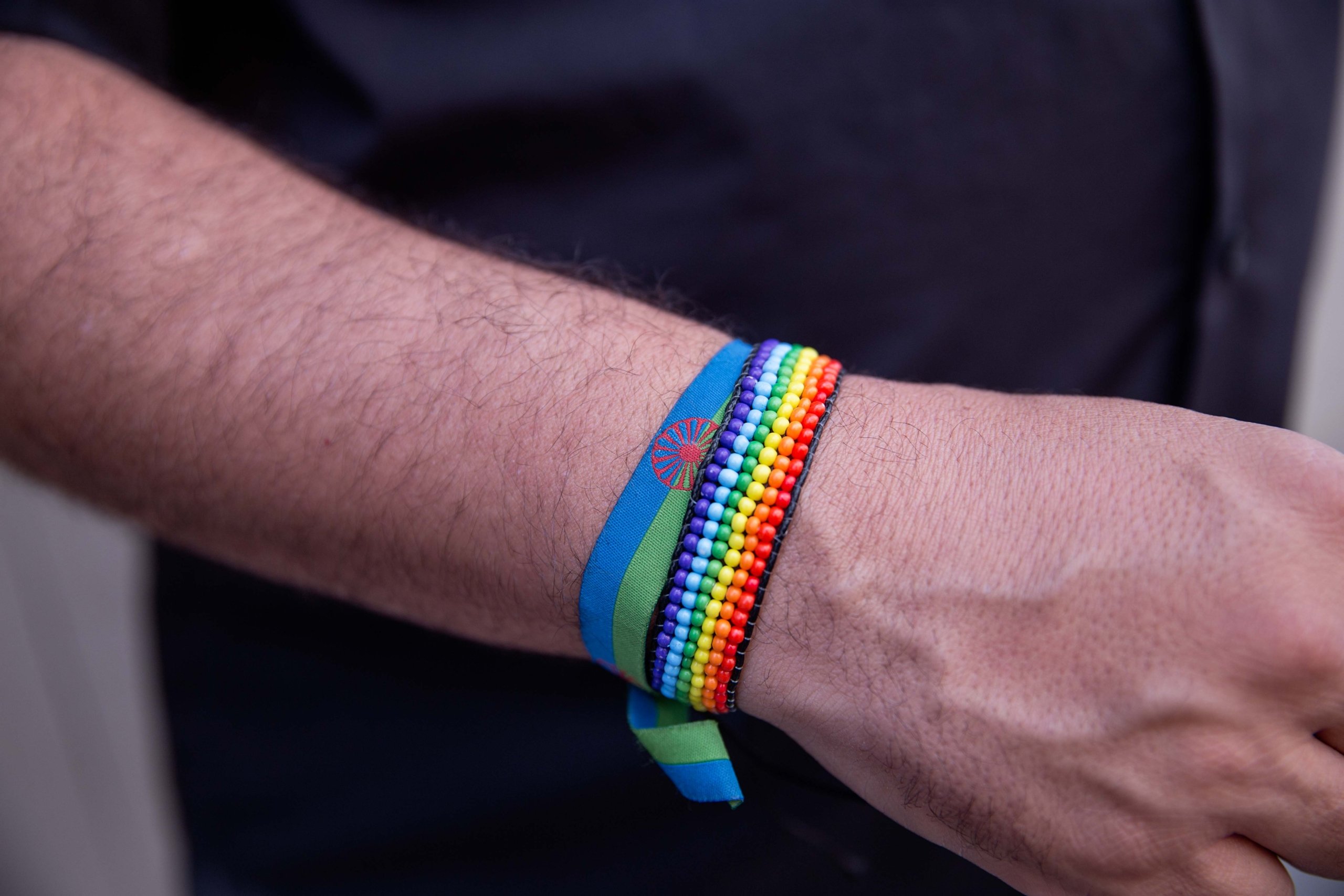
Romani and LGBT+ solidarity wristbands. Photo by Bex Wade For Gypsies, who have been systematically excluded from the protections provided by social services and welfare state, the only institution which has protected us has been our own families, at every level. That is why we so often live in groups. I personally don’t want to live with 30 people in a house, but my people often have to do this out of necessity. The different social institutions have denied support to the Gypsy community systematically, and so we turn to our own for support.
There are many dissident Gypsies who do not classify themselves as lesbian or gay because they have to continue to live within this family environment, and yes because for many Gypsies being gay or lesbian is being payo. Identities are complex and multifaceted…It’s really important for us to be able to continue to claim our Gypsy identity and be sexual dissidents at the same time.”
-
Ensuring that Roma women are heard – an interview with Fakali
by Emma Eastwood
My name is Sandra Heredia. I’m 33 years old and from Córdoba. I’m responsible for international, national and EU relations at the Federación de Asociaciones de Mujeres Gitanas Fakali. I also collaborate with the Consejo Estatal del Pueblo Gitano and my background is in sociology and gender studies.
My name is José Vega. I’m Roma, 33 years old and I’m a social worker. With Fakali I work in schools raising awareness of Roma culture and anti-Gypsyism. I also manage community relations and our social media channels.
Anti-Gypsyism
Sandra: Fakali is an organisation that came out of a group of feminist, Roma university students. Imagine all of those three things together! Mainstream society just couldn’t imagine that people like us existed. We wanted to shatter myths and prejudices and make sure that Roma women’s voices were heard.
I really don’t like to homogenise Roma. This happens a lot when you’re talking about ethnic minorities. Everyone has a series of variables that affect them, such as class, gender, health, location and functional diversity. We come from Roma families, but in many cases, we don’t conform to the stereotypes associated with us by majority society. People often say to us, ‘Oh you don’t seem like a Roma.’ It’s because we have a university education and a job. It’s all about intersectionality. For Roma people who conform to the typical stereotype, their daily reality is totally different from ours.
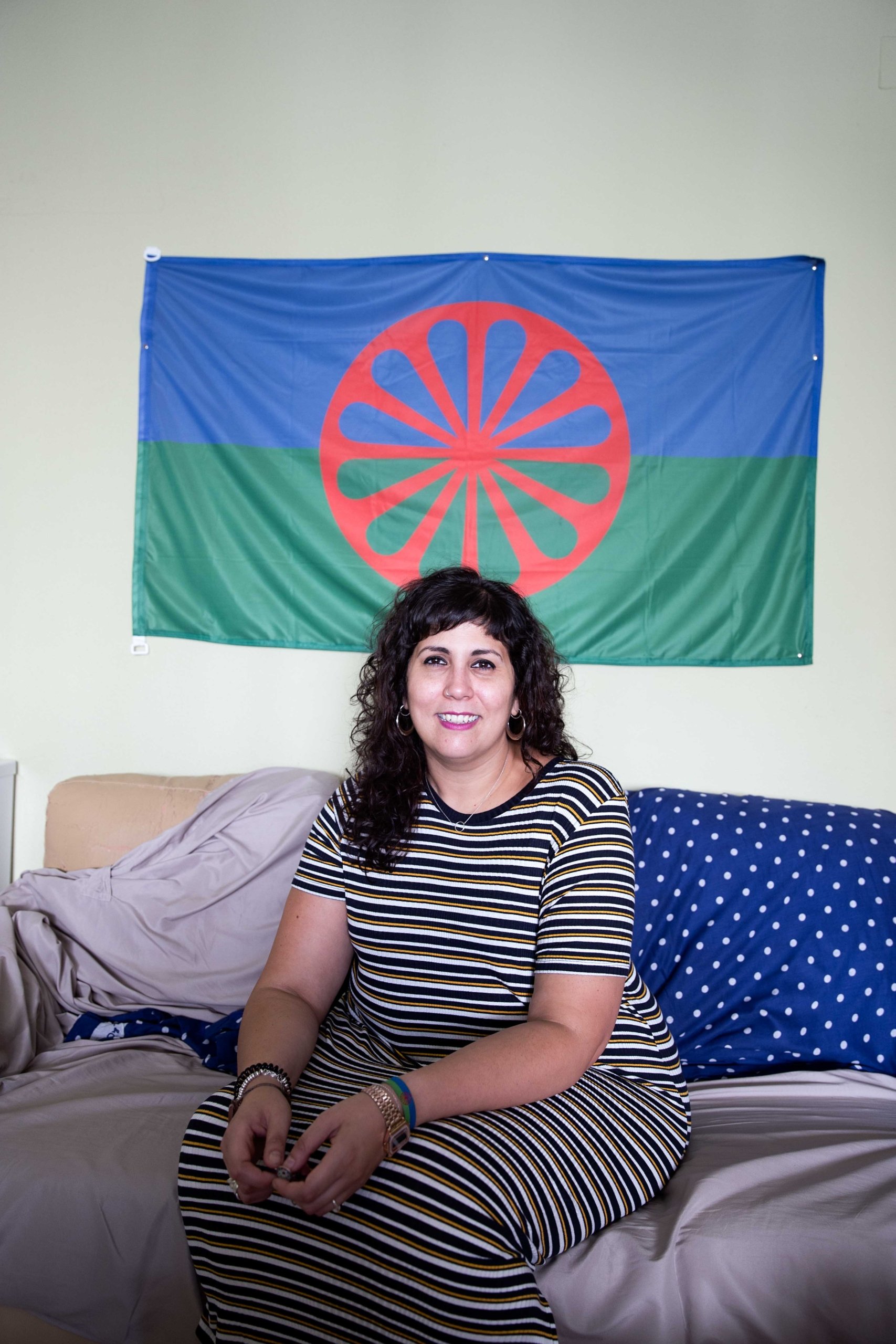
Sandra Heredia from Federación de Asociaciones de Mujeres Gitanas Fakali. Photo by Bex Wade We felt that we needed to give a different name to the type of racism we suffer as it differs from the racism other groups suffer, and so we came up with the phrase anti-Gypsyism. It can range from a joke in a bar, to not being served in a shop, to how the media disseminate a very stereotyped image of Roma – we’re always the thieves, the illiterate ones, the ones who give society a bad name. We’re the problem, the mirror that majority society views itself in to feel how good they are and how bad we are.
In Andalucía in the 1970s and 80s there were anti-Roma groups who forced us out of small towns and villages. It was like the Middle Ages. Just a few years ago in Huelva and Jaén some Roma families almost lost their lives when they were caught stealing and a group of villagers tried to burn their houses down.
The anti-Gypsyism that we experience here in Spain ranges from the most subtle to incredibly violent forms of racism. Many members of our community have no access to decent jobs, live in huge neighbourhoods where poverty is extreme; where your human rights are not even guaranteed; where if you go in to a shop the assistant follows you around; where you are prevented from entering a nightclub, or someone crosses the road to avoid walking near you.
This is not just our perception. There are studies in Spain, and within the EU in which they collect the views of majority society. In a Eurobarometer survey a question was asked about who you would least want as your neighbour giving a range of options, such as extreme right wing, extreme left wing, people with mental health problems, gypsies. And who do you think won? Yes, Roma of course.
Anti-Gypsyism permeates everything. It’s structural and goes back centuries. The last study that the WHO did revealed that Roma people may expect to live 15 years less than majority society.
The reality
José: Roma often live on the outskirts of the city. For example, in Sevilla there are six very disadvantaged areas on the periphery where more than 80 per cent of the population is Roma. In the Triana neighbourhood, which is in the centre and traditionally the place where there were most Gypsies in the city, they evicted the Roma families and rehoused them on the outskirts in poor conditions with a lack of basic services. There, life expectancy is drastically reduced and mental health problems are rife. We see this lack of provision of basic services by the state as a manifestation of anti-Gypsyism.
In education too, it is evident. Far too often there is no reference in school books to the Roma population nor the indispensable role they played in the creation of flamenco. Andalucía is often defined as the part of Spain most associated with flamenco, and it’s no coincidence that this is where most Roma have lived, yet it’s so often invisibilised. We’ve also noticed that in the schools where there are more Roma, the numbers of teachers and services provided are less than in schools where the Roma population is smaller.
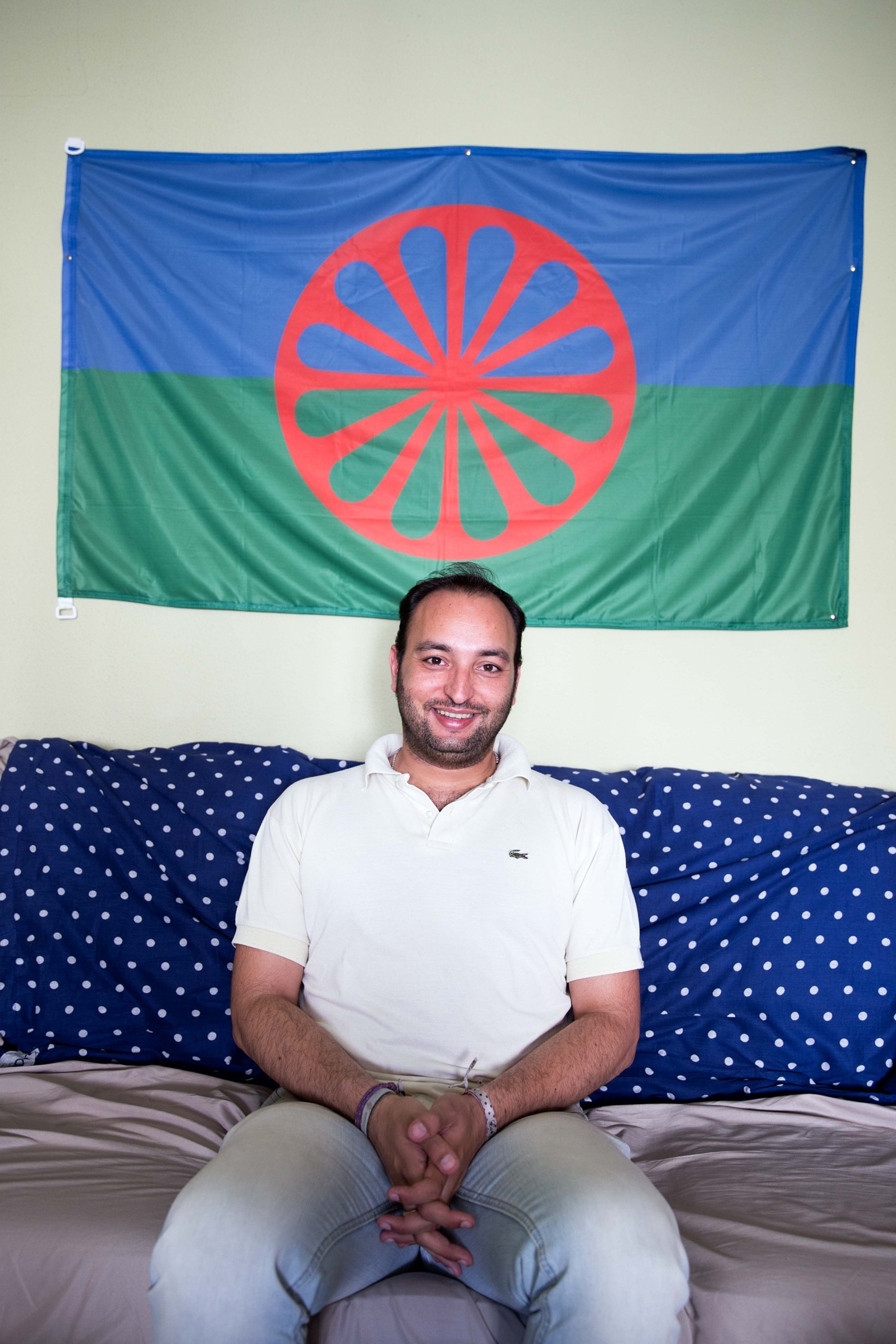
José Vega from Federación de Asociaciones de Mujeres Gitanas Fakali. Photo by Bex Wade Let’s also talk about political representation. In Andalucía, which we think has more than 600, 000 Roma, in all of the years since we’ve had democracy not one Roma has become a member of the Parliament. It’s the same story at a state level. There has been exceedingly scarce representation in all of the legislatures.
As a result, there is no social policy which contains cultural and ethnic elements appropriate for Roma. It’s taken until now for a three-year plan to be created in Andalucía for the social inclusion of Roma. We really hope that it isn’t just a bundle of good intentions, but instead something that truly works towards improving the situation for the Roma population.
Roma people need to be able to defend the rights of Roma. We have a huge population, although we don’t even know exactly how many we are in Spain, but we are political subjects ourselves and we need to be present in all of the government’s decisions. We can’t be apart from that, because so many of the decisions which affect us are not taking in to account our daily reality.
Confounding stereotypes
Sandra: We always say that Roma women were among the first feminists. We are accused of being a patriarchal society, where women are invisibilised, but the reality is totally the opposite. Back in the day when women from majority society didn’t occupy space in public life, Roma women, who were strongly associated with art and culture, worked in cafes and theatres. They travelled to other countries to buy fabrics and antiques. They worked in the domestic environment, but they also worked in the street. They had double lives. In so many ways they were emancipated. They were often the main wage earners for their families.
In Fakali, we make sure that all the visible and decision-making roles in the organisation are occupied by Roma women. We work very closely with Roma girls and boys in schools and strongly believe that they need to have positive and diverse Romna role models. They can see that Roma women can be teachers, psychologists, lawyers, doctors. We especially concentrate our efforts in the disadvantaged neighbourhoods, where poverty, exclusion and inequality indicators are so high.
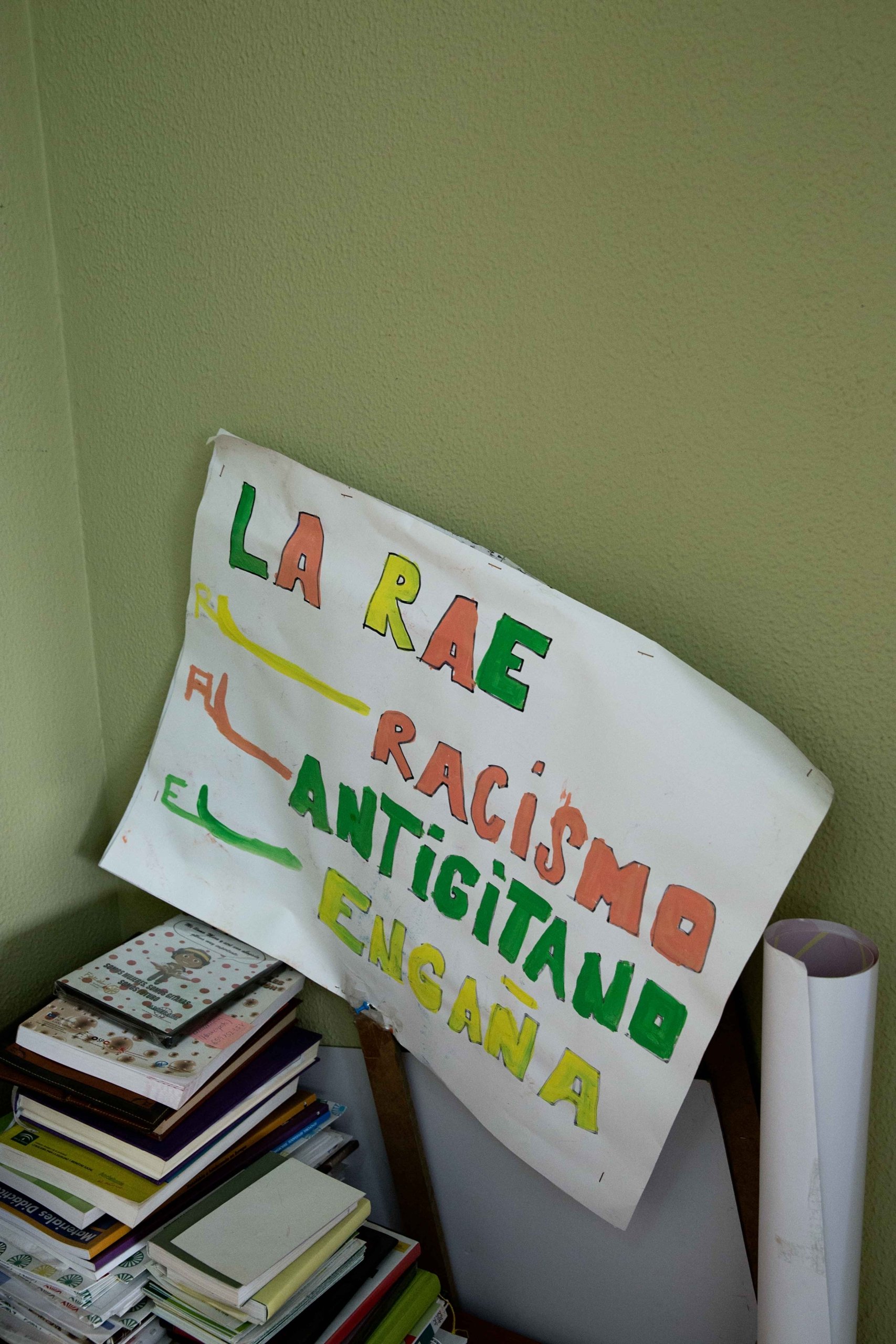
Protest signs in the Federación de Asociaciones de Mujeres Gitanas Fakali office. Photo by Bex Wade We reject the word ‘integration’. We don’t like it. We don’t see why we have to integrate with anything. We think that there should be models of coexistence where our identity is respected, and not homogenised. Our diversity is our wealth!
It’s said that Roma women suffer double discrimination, but I think we suffer multiple discrimination. In Fakali we also have male employees, because we think it’s important as feminists to have male allies. Our feminism makes no sense without our men. We also never talk about our feminism without taking in to account anti-Gypsyism.
I don’t like to talk about privilege, but some of us have had more opportunities. If we lived in a society which could guarantee equal opportunities, above all for minority groups, this inequality wouldn’t even exist. We are here with you talking about the realities of our community, but we know that in the poorest neighbourhoods of Andalucía there are Roma ghettos, where there is no way out of the spiral of poverty. So, we want give a voice to those Roma women who do not have access to the same opportunities as us. We want to guarantee their rights, but without them or us losing our identity. It’s our way of putting in to practice our feminism, always in alliance with other feminisms. We take part in many different platforms with our sisters, we want to give voice to non-hegemonic feminism, to form alliances with our Muslim and afro-descendant sisters. We think we share so much more with them. We also of course support the idea of Romani dissidence, and the Roma LGBTIQ community. Without feminism you can’t talk about Romani dissidence.
An international Roma family
José: There are barely any differences between Roma and gitanos, especially taking in to account the diversity present within Roma society. As Spanish gitanos we are conscious of being Romani, and we’re very proud of it. At the same time, our culture also includes aspects of the culture of our Muslim and Jewish brothers and sisters. And this of course is then intimately linked with Andalucian culture.
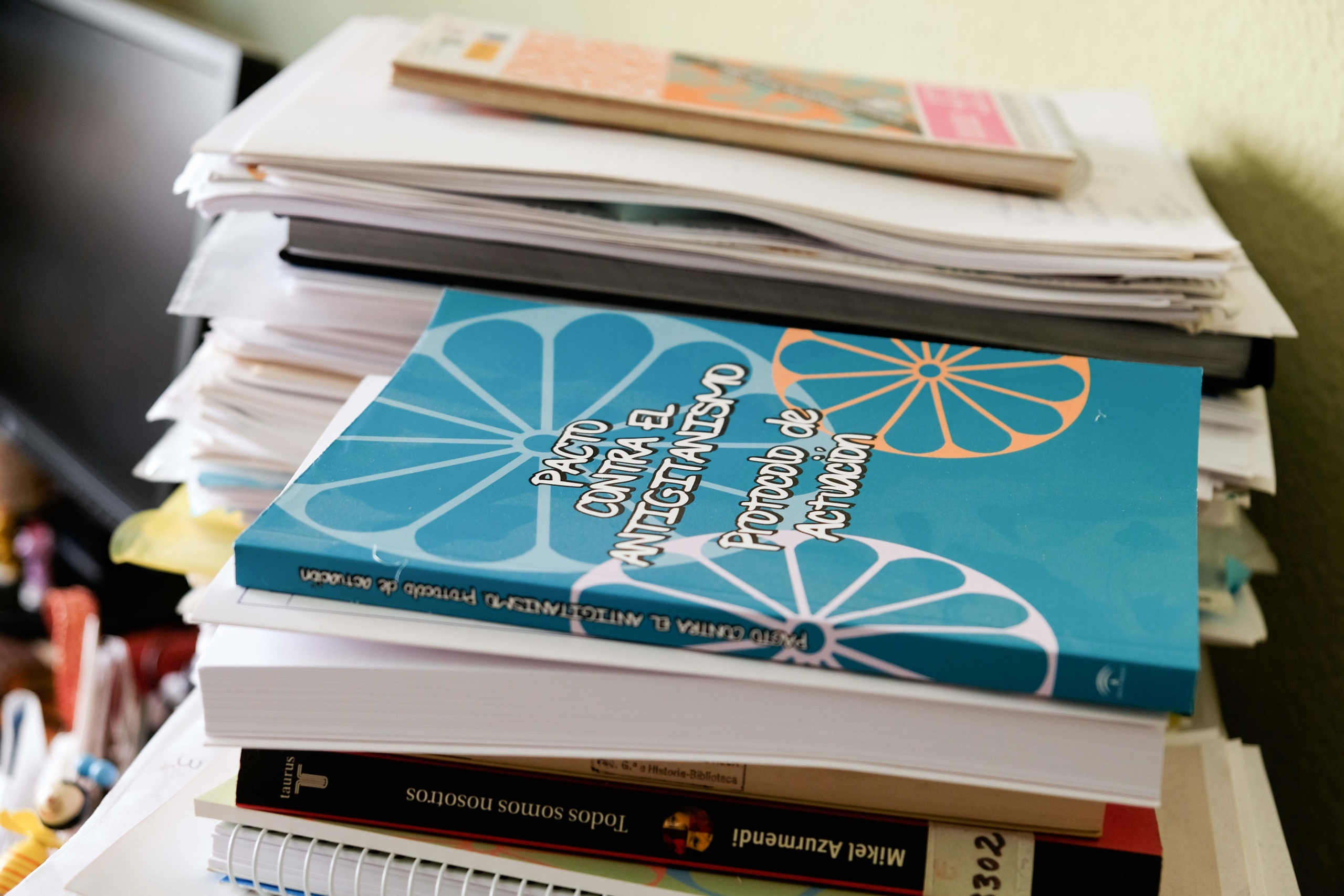
Federación de Asociaciones de Mujeres Gitanas Fakali literature. Photo by Bex Wade Our relationship with our Roma sisters and brothers around the world is very positive. For example, after the statements made by the Italian minister Matteo Salvini, we went out on to the streets to protest. This has had a direct effect. In the Spanish Congress a letter condemning the ethnic census that Salvini is proposing was read out. We hope that our Italian Roma cousins know that they are not alone. We are the biggest minority in Europe and we are more than 12 million people worldwide!
Sandra: We went to Manchester as part of a project called Real Rom and met up with other Roma. We felt at home straight away with them. We met with migrant Roma from other parts of Europe, suffering double discrimination, as migrants, and as Roma. A group of them came to Sevilla too. It was really valuable for us, like being part of a big family. We don’t have land or a nation, we don’t have economic power, we have survived La Gran Redada, the Holocaust, persecution, attempts to annihilate us simply because of who we are, and here we are still fighting.
Fear of a census
A census of the number of Roma in Spain doesn’t exist, we really don’t know how many of us there are. In many families there are people who simply don’t identify as Roma and therefore as time goes on the connection with Roma culture has been lost. I understand why this happens, Fakali’s President talks about it in terms of coming out of the ‘ethnic closet.’ It’s totally understandable because of our history of repression. Also, there are people who hide their Roma identity, such as those who have jobs with a lot of responsibilities in the public and private sector and don’t outwardly manifest their identity for fear of losing their status. We respect those who take a step forward and show their Roma identity publicly. But it is so important that as a community we are visible.
There is a lot of fear about a census, on how the information might be used in a perverse way, as we have seen in the case of Italy. This was exactly the case during La Gran Redada. The Catholic church organised a census of gitanos in order to be able to expel them from their homes. It’s complicated. We need to know how many we are in order to know if we are represented. So yes, it’s a double-edged sword, on the one hand access to power, on the other a deep mistrust because of our history.
José: In the national census there is no provision for self-identification in terms of ethnicity. Most of the data that exists on this comes from the data we provide to the Ministry of Work and Social Services. However, if there was ever a meaningful census of Roma in Spain, where people felt able and safe to reveal their identities, I think that it would show that there are at least one million of us.
On the future
José: In the short term our path is one of struggle. Our main problem is anti-Gypsyism. The economic crisis which Europe has been experiencing means that minority groups have ended up being the scapegoats for many situations. But at the same time as the extreme right have been pushing their message, we have been growing in strength. We have many more allies than we had ten years ago. And many more people are interested in Roma culture, in multiculturalism, in recognising that Andalucía is what it is because of the input from so many different cultures.
Sandra: I have three fundamental points for a hopeful future. Firstly, reparations. All of the attempts at annihilation must be recognised. We have been victims of a racist system. Secondly, recognition of the input from Roma people. We are central to what makes Spain what it is today. And lastly, emancipation. We need to become political subjects ourselves, with our own voice. We don’t need interlocutors anymore – we’re prepared to speak for ourselves. Nothing about us without us.
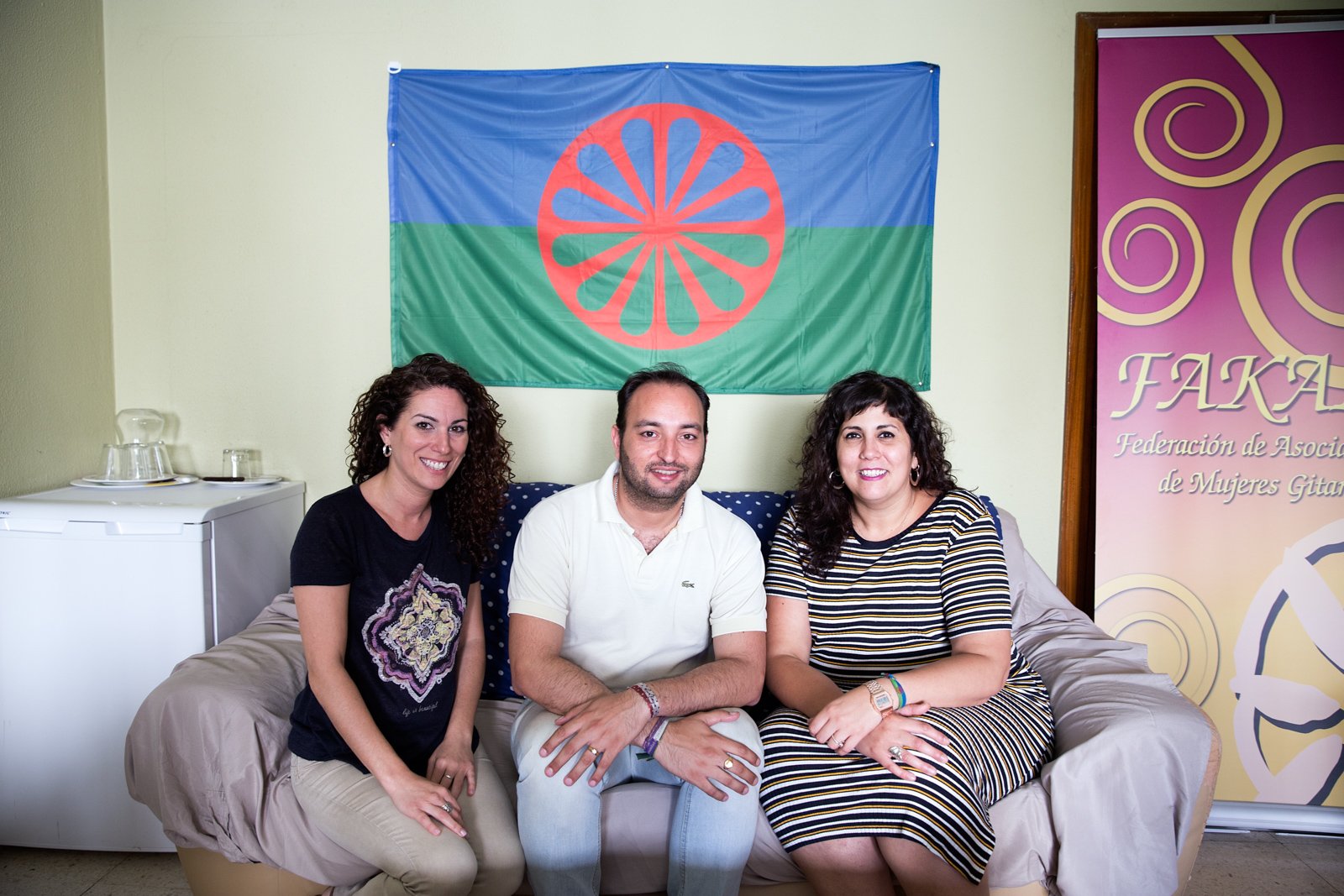
The Federación de Asociaciones de Mujeres Gitanas Fakali team in Seville. Photo by Bex Wade Photos by Bex Wade
-
Photo story: La Negri
Photographer Bex Wade writes about seeing one of the community’s key role models perform at Madrid Pride.
After spending time being immersed in the warmth and community of the Gypsy sexual dissidents, it seemed only fitting that my last night should be spent with them watching their heroine, Noelia Heredia, perform at the closing party for Madrid Pride. La Negri, as she is affectionately known, had been fondly mentioned by many Gypsies we’d interviewed, so I was especially excited to see her in action.
Hailed as a pioneer within the Gypsy community as both a musician and for her activism, she has given a strong and supportive voice to those who are LGBT and Gypsy. La Negri has performed at many Pride festivals and in 2016 was presented with an Equality Award from The Adriano Antinoo Association for her fight for equal rights. A flamenco singer and self-taught cajon player, La Negri has performed globally, but as she told me later over a family dinner, concerts such as Madrid Pride in the heart of her own community mean so much to her. She explained, ‘In the future, equality is needed for Gypsy people. I imagine a future where you have freedom to choose who you are.’
As La Negri ended her captivating performance she held aloft both rainbow and Romani flags, beaming as she listened to the cheers of the crowd shouting her name alongside cries of, ‘Thank you,’ and ‘We are seen.’ Her fans in Plaza del Rey erupted, it was clear in that moment just how important role models are to communities who seek visibility, and the part music and notoriety can play in connecting marginalized peoples.
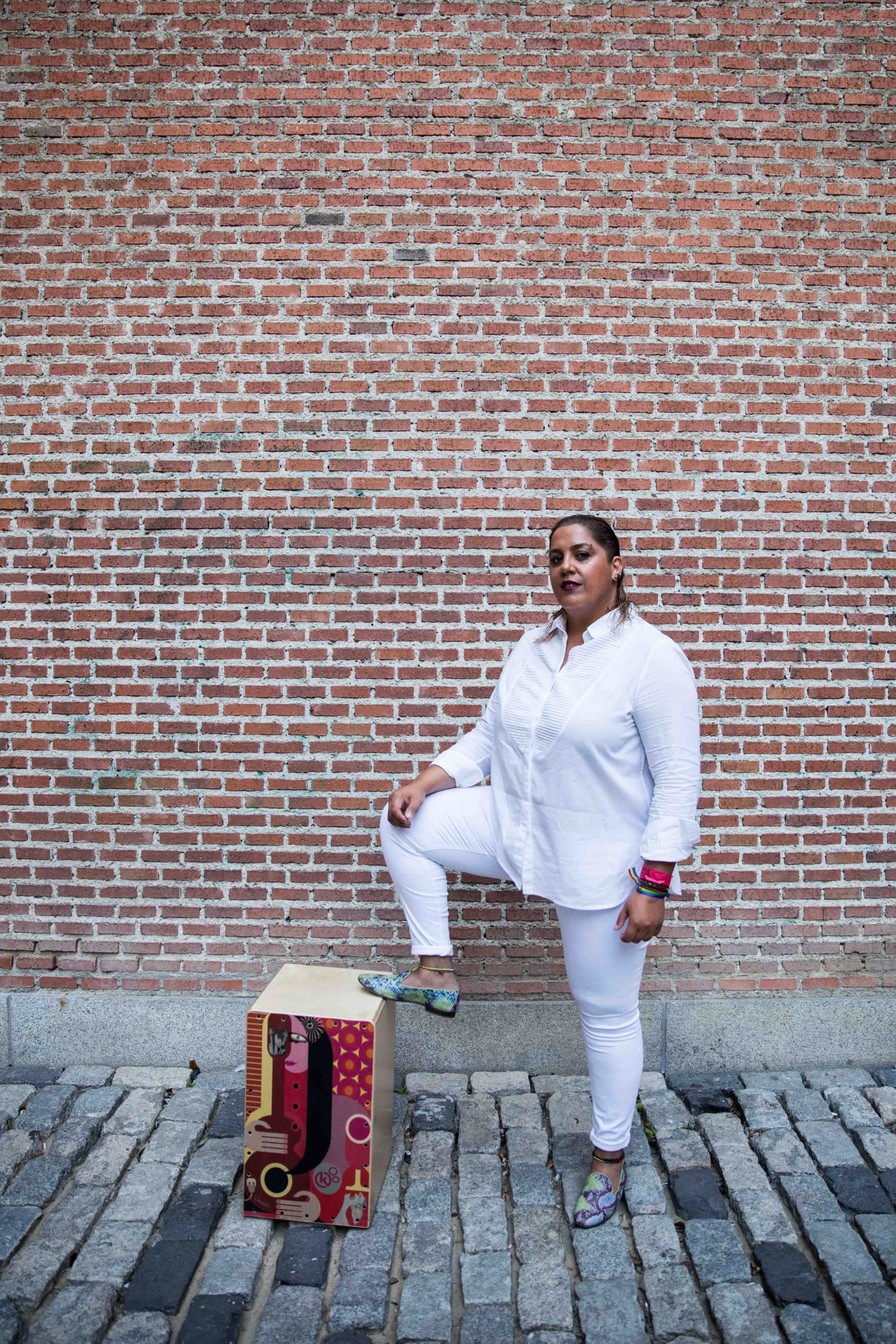
La Negri, backstage with her cajon. Photo by Bex Wade. 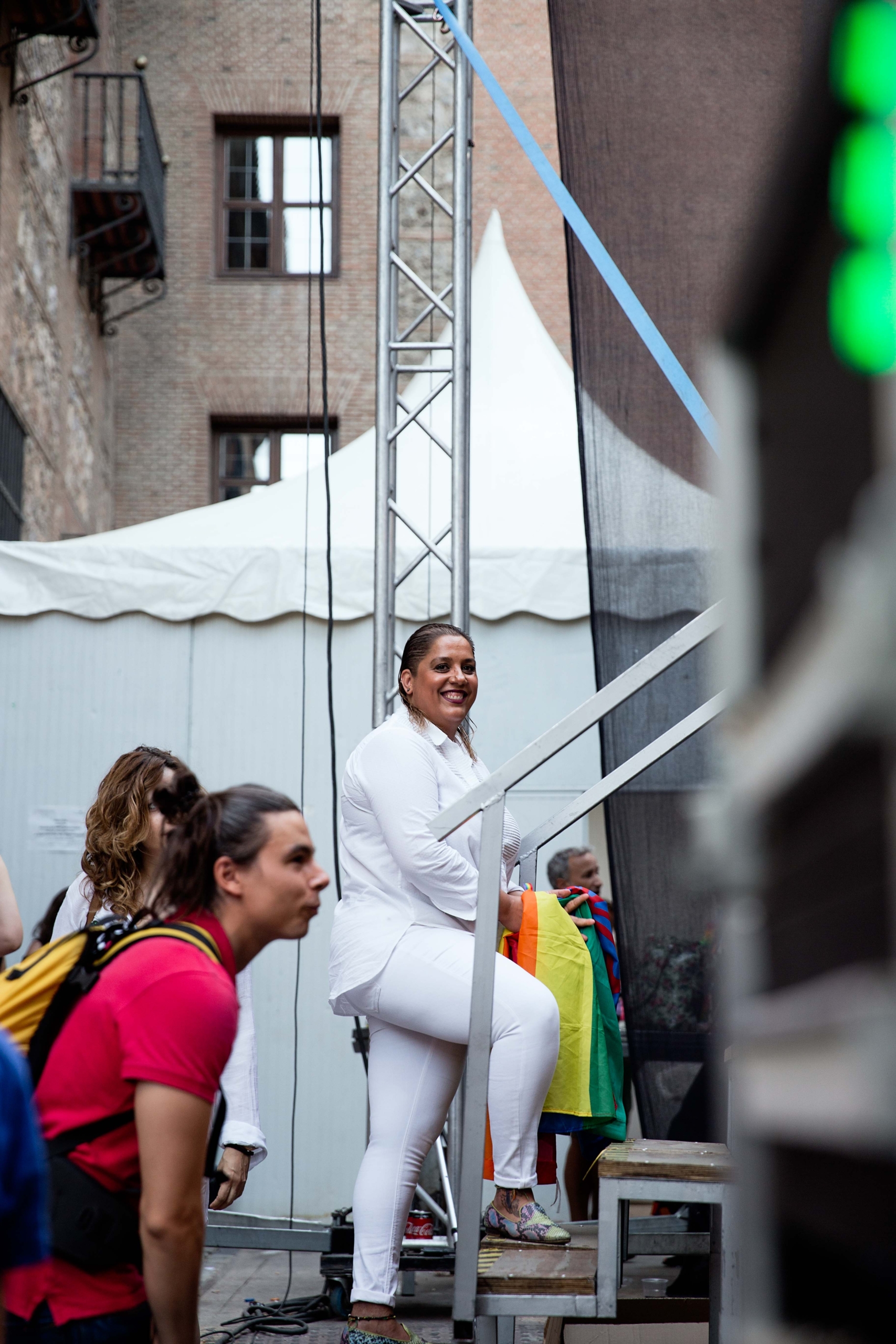
La Negri, waits to take the stage. Photo by Bex Wade. 
La Negri performing at Madrid Pride 2018. Photo by Bex Wade. 
Crowds holding the Romani flag high in Plaza del Rey at Madrid Pride, 2018. Photo by Bex Wade. ‘In general if you’re a Gypsy… your difference is visible all the time, like being inside a crystal ball.’
-
An interview with Iñaki – on being a Romani sexual dissident
by Emma Eastwood
My name is Iñaki Vazquez, I’m 50 years old. I identify as a Gypsy, and as a marica (queer). I say queer intentionally because for me reclaiming that word is political. Marica is used an insult, but by redefining it we are questioning it and making people think. Defining yourself as gay in Spain, and more generally in the west is also a question of class and ethnicity, and I’m not a man who belongs to the upper classes, and of course, I’m also a Gypsy. I’m also a man in a patriarchal society, with all of the privilege that brings with it. Oh, and in terms of national identity I’m Catalan. All of my identities could be seen to be contradictory, but I prefer to say that my identity is not stagnant, all of my identities are mixed up with each other.
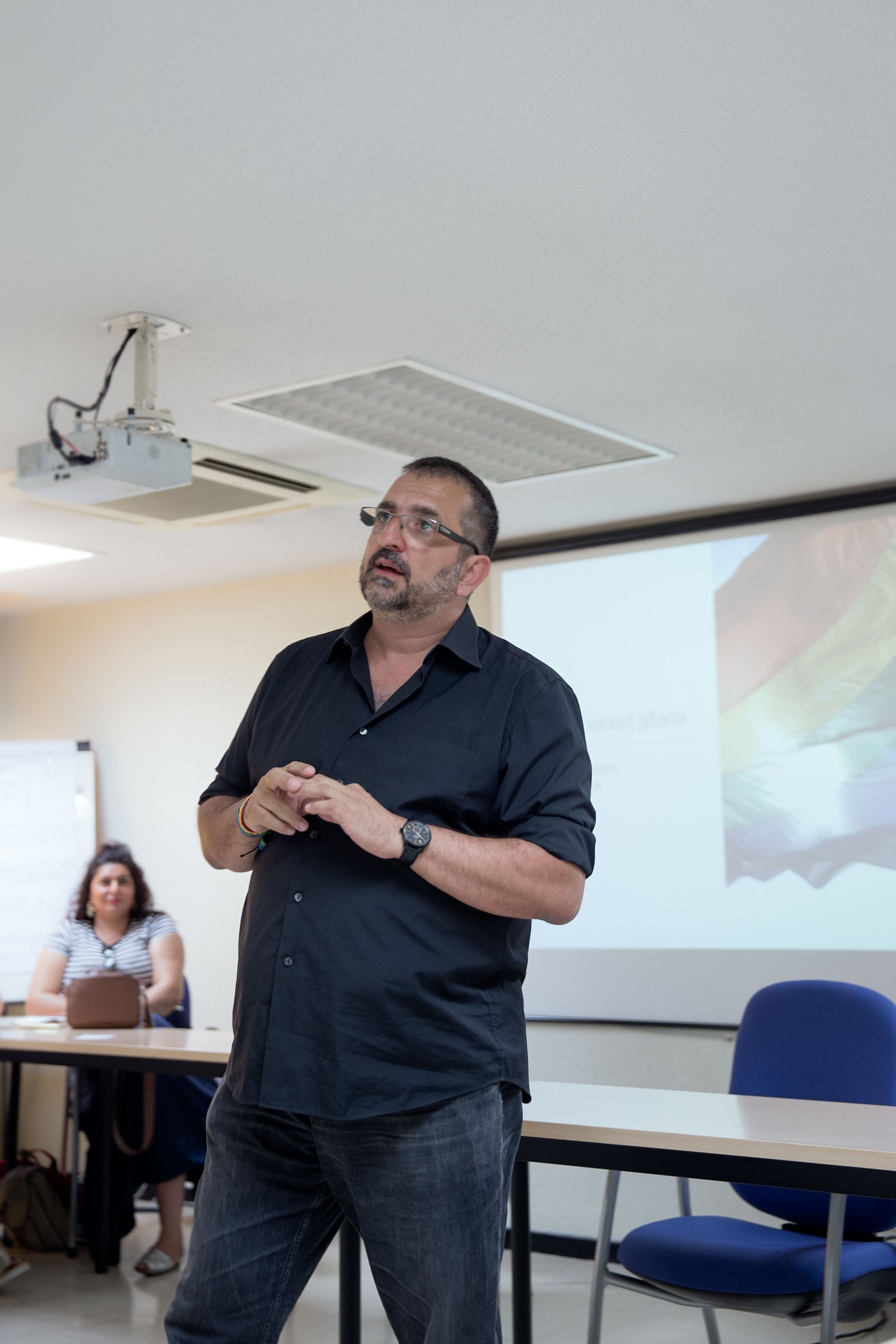
Iñaki giving a talk at the Ministry of Health in Madrid, July 2018. Photo by Bex Wade. So, I’d say in my case it has been a process of building my own identity, through my activism and a position of pride in who I am. I always knew that there needed to be an interlinking of my Gypsy and LGBT activism. In truth I can’t say that I’ve been on the receiving end of discrimination. In my opinion it comes from your own attitude. I know it’s very complicated, but I think having pride in who you are is very important. You must draw a line in the sand and no one should cross it in terms of respect. Actually, this is a really Gypsy value.
How was your coming out process?
Complicated… I’m 50 years old and I came out at 22, so almost 30 years ago. The situation and the opinion of the majority of people in Spain was very different from today. But reflecting on it now, in my coming out process I find aspects of my ethnicity. For example, Gypsies often say hello to each other with the phrase, “Salud y libertad” (health and freedom). For us freedom is a core value, something we can’t give up.

Romani and LGBT solidarity wristbands. Photo by Bex Wade. Obviously, I was under a lot of pressure. I’d had girlfriends and all my family had expectations that I would marry a Gypsy woman, and to disappoint them was a huge amount of pressure. But there is a certain force that carries you forward, and you tell yourself to be true to yourself. I felt terrible because I was with a woman who I loved very much, but knew I preferred sex with men. But at the same time, I had the attitude of, “I’m gay and so what?” and I think it helped because in the end I didn’t really have too much opposition from my family. Of course, they needed their time to process it. But I’ve always had the support of my aunts, my sisters, my mother and, in the end, also my father. In Reus where I am from we organised the first LGBT demo in Catalunya outside of Barcelona. I was a leader back then with a lot of responsibility and a group of parents of lesbians and gays in Catalunya came and my mother joined them with her own placard. I asked her what she was doing, and she said, “Well, you’re my son aren’t you?”
I’m the coordinator of a state-wide Gypsy organisation, called Plataforma Khetane. They don’t have a public position on LGBT issues, but they have employed me in a key role and I know that means that there is an implicit respect towards my personal process and I value that.
Being a role model
I do feel that I am a role model, although it doesn’t feel like a heavy responsibility. I don’t mind shouldering that responsibility because I am of a certain age and have support from my family, which many people do not have.
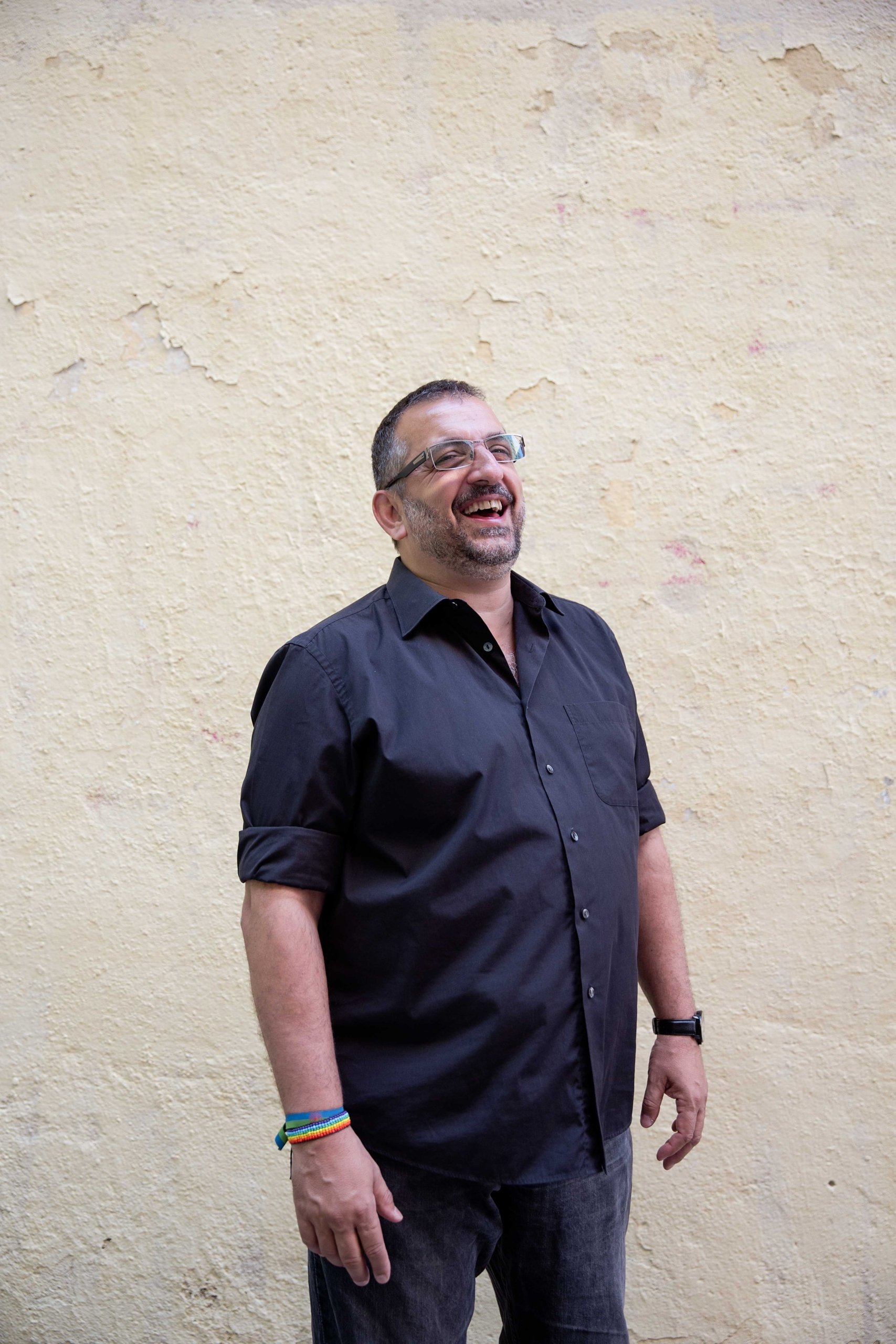
Iñaki Vázquez Arencón. Photo by Bex Wade. Over the last few years I came to realise that there are a lot of people around who are going through similar processes, in Valencia, Jaen, Barcelona, Madrid, Alicante. Effectively we have become reference points throughout Spain. What’s strange though is that 15 years ago we would have been on the margins of Gypsy society, but in fact we have ended up being not just LGBT reference points but also for the Gypsy movement as a whole. My impression is that there are not that many people out of the closet but there are many, many people who look to us for guidance. Take today for instance, I’m going to participate in an activity at the Ministry of Health. They called us because they have so many LGBT Gypsies approaching them for support and advice.
Ververipen
The driving force behind us setting up the Ververipen (meaning diversity in the Romani language) group was Demetrio Gomez. He is a key figure at a European level for the Spanish Gypsy movement. His idea was to work on many aspects related to diversity, not only sexual orientation or gender identity, but all aspects. He started with a Facebook page but through that we all began to get to know each other. I for instance, due to my relationship with a magazine in Catalunya, published interviews with LGBT Gypsies in Spain.
At the beginning the Facebook page was private and hidden, in order to protect people if needed, but now it is public. We formed an association and began work in Spain and also in Europe. We’ve participated in two European meetings in Prague and have contributed to the Prague Declaration. It ended up being a founding manifesto for us, in which we put forward the issue of Romani sexual dissidence in Europe and the necessity of incorporating the idea of diversity within the complex identity of Romani people. We then shared this with Romani organisations and European institutions.
I’d say in the last two years we’ve been working on increasing the visibility of Gypsy sexual diversity and dissidence at many events in Spain, including during Pride in Madrid. We hope that shortly we’ll be able to organise an international meeting in Madrid with the participation of Romani sexual dissidents from all over Europe. We’re just a few at the moment, but we believe that we’re about to take a major qualitative and quantitative step forward.
Hopes for the future
I think we need to find our own way of being sexual dissidents, and this shouldn’t be by denying our Gypsy identity as it’s so important for us to maintain that. I think there will be a lot of difficulties along the way, but it’s unstoppable now. It doesn’t have to be the same as in other movements, we can do it our way, and it will need many pauses for reflection. We also need to work closely with families, and to show how many Gypsy people down the ages have also been sexual dissidents, in order to break down some myths that have arisen amongst our community.
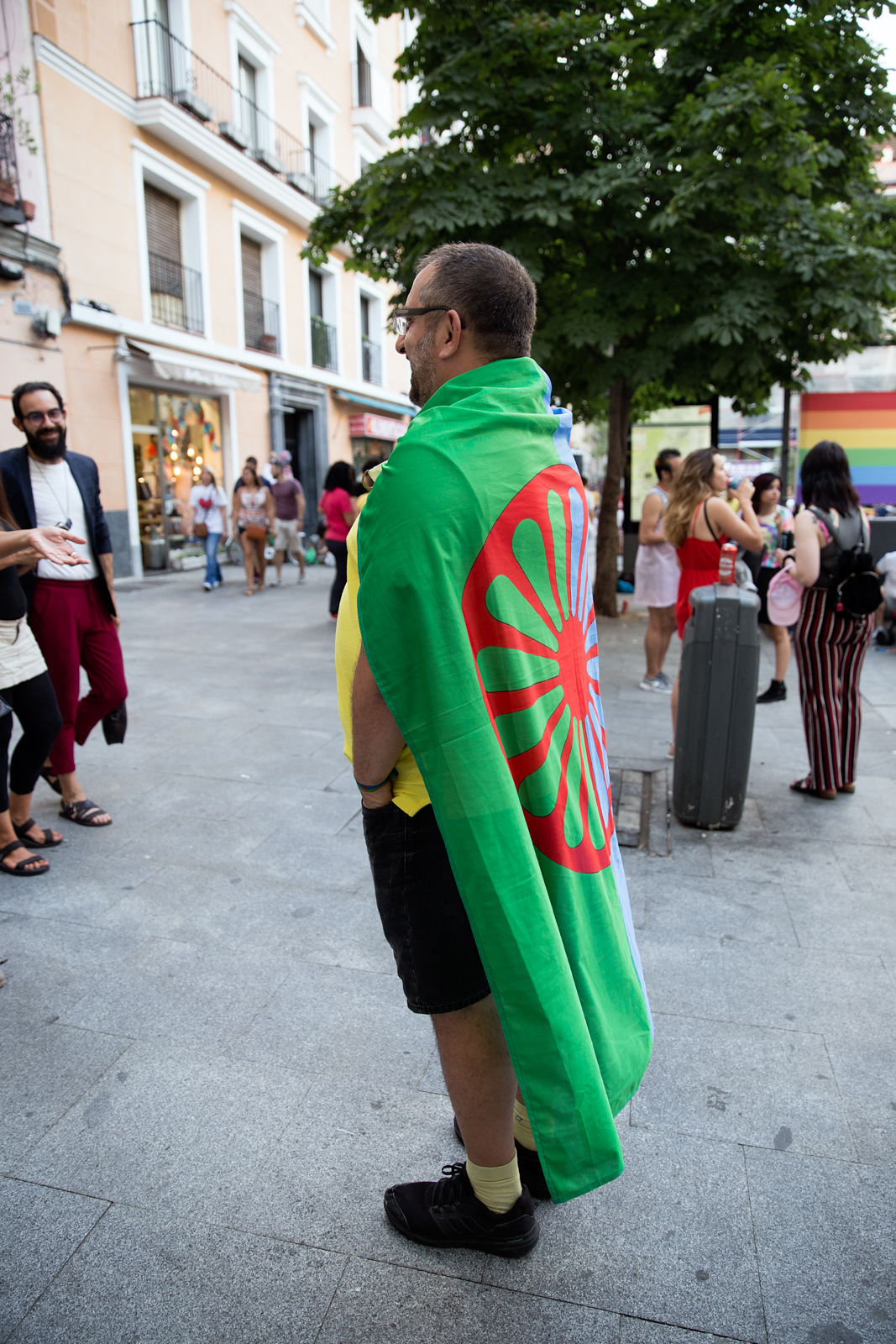
Iñaki Vázquez Arencón at Madrid Pride, 2018. Photo by Bex Wade. I think our movement will grow. We are trying to transcend the norms, so that the norms are not our prison. Let’s break with the rules so that we can live in greater liberty.
I am an optimist. I think things are changing, above all for the younger generation and because of sexual dissidents increasingly becoming visible reference points for the Gypsy community as a whole. This means that in one way or another the Gypsy community trusts us. This is such an important issue for us, because of our story of persecution over centuries.
Photos by Bex Wade.
-
An interview with Dani – on diversity, dismantling stereotypes and the Gypsy matriarchy
by Emma Eastwood
My name is Daniel Janoher de Vargas. I’m 21 years old, and was born in Hortaleza, Madrid.
My family is of mixed ethnicity. My father isn’t Gypsy, my Mum yes. In the first place, I’d say I’m a human, a person, but I also see myself as a Gypsy. I’ve spent a lot of time with my grandmother, she pretty much brought me up, she shared her life with me, and has left a pretty important Gypsy legacy with me, a pride in who I am.
Women in the Gypsy community play an important and fundamental role. Majority society has always put forward an image of Gypsy society being dominated by men, by the patriarchy. It’s a huge misnomer. In my house, my Mum and my grandmother formed a matriarchy. They earned all the money, taught us right and wrong, our values. In almost all Gypsy households, women play a central role. My grandmother is the first to know if anything happens, and the first to take action.
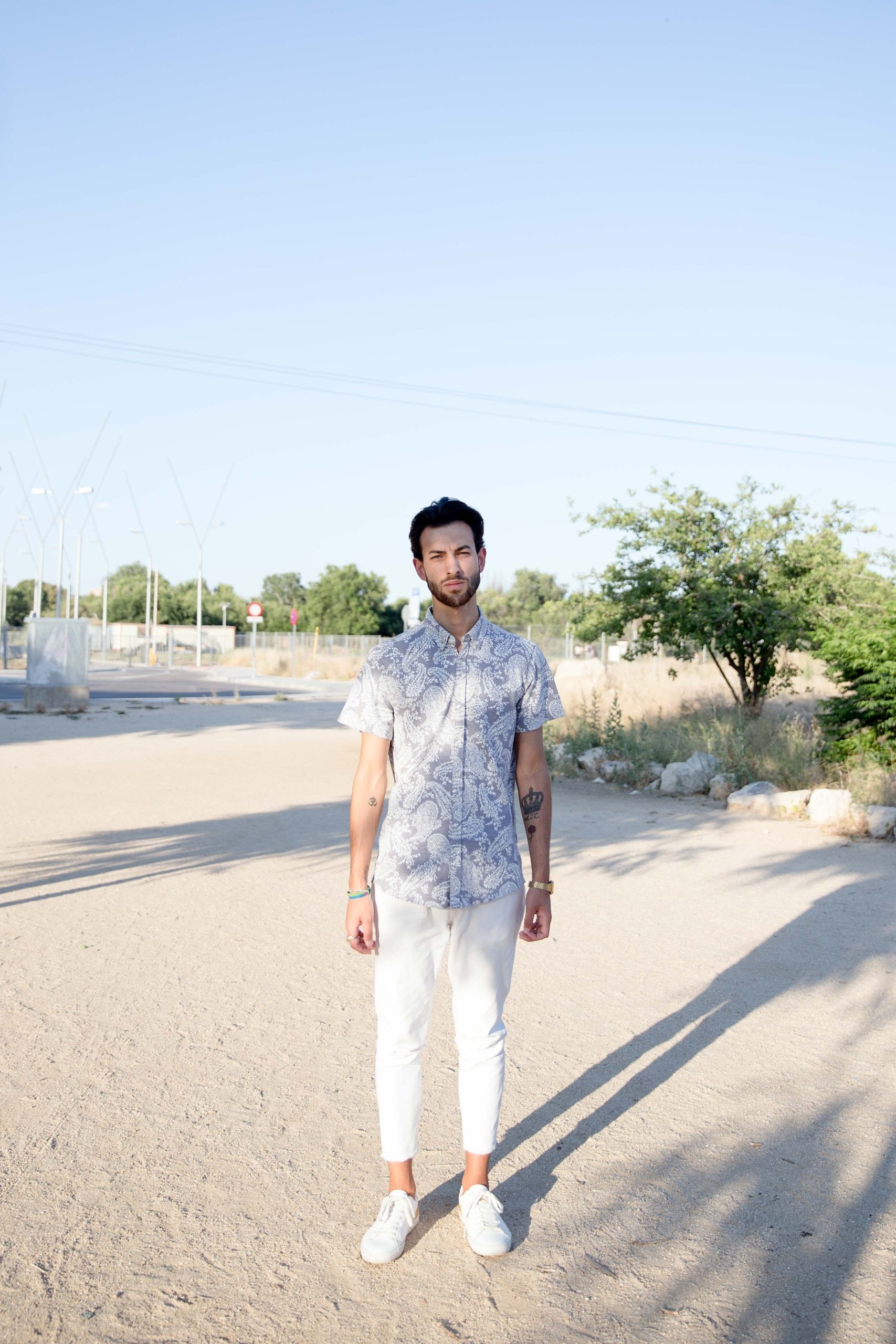
Daniel Janoher de Vargas. Photo by Bex Wade. Machismo has always existed. All over the world. When my work mates say to me, ‘Gypsy men are so macho.’ I say to them, ‘And in your house the men aren’t macho? Talk to your grandfather and see what they say.’
Of course, there are macho Gypsy men, but there are macho guys everywhere. It’s as though non-Gypsy society is feminist, and all Gypsies are macho. Although my Mum and my grandmother would never call themselves such, I always say, they were born feminists.
My life is exactly like the people I work with, like every other Spanish person. It’s no different because I’m a Gypsy. I don’t think there are so many differences between Gypsies and non-Gypsies in Spain today. You can’t even tell the difference in the way we look anymore. Some of my friends, they’ve known me for months, and then for one reason or another they find out I’m Gypsy, and say things like, ‘Oh, you don’t look like a Gypsy,’ and I say, ‘What do I need to look like to seem like a Gypsy?’ I don’t understand it. What manners do I need to have, what gestures, what ways of speaking, so that I look like a Gypsy?
Generalising a little, it’s understood that Gypsy people are originally from India. Obviously therefore, the majority of us have dark skin, dark eyes. But there are also loads of us with blond hair, blue eyes….It’s all about stereotypes. Hopefully in my lifetime these stereotypes will disappear.
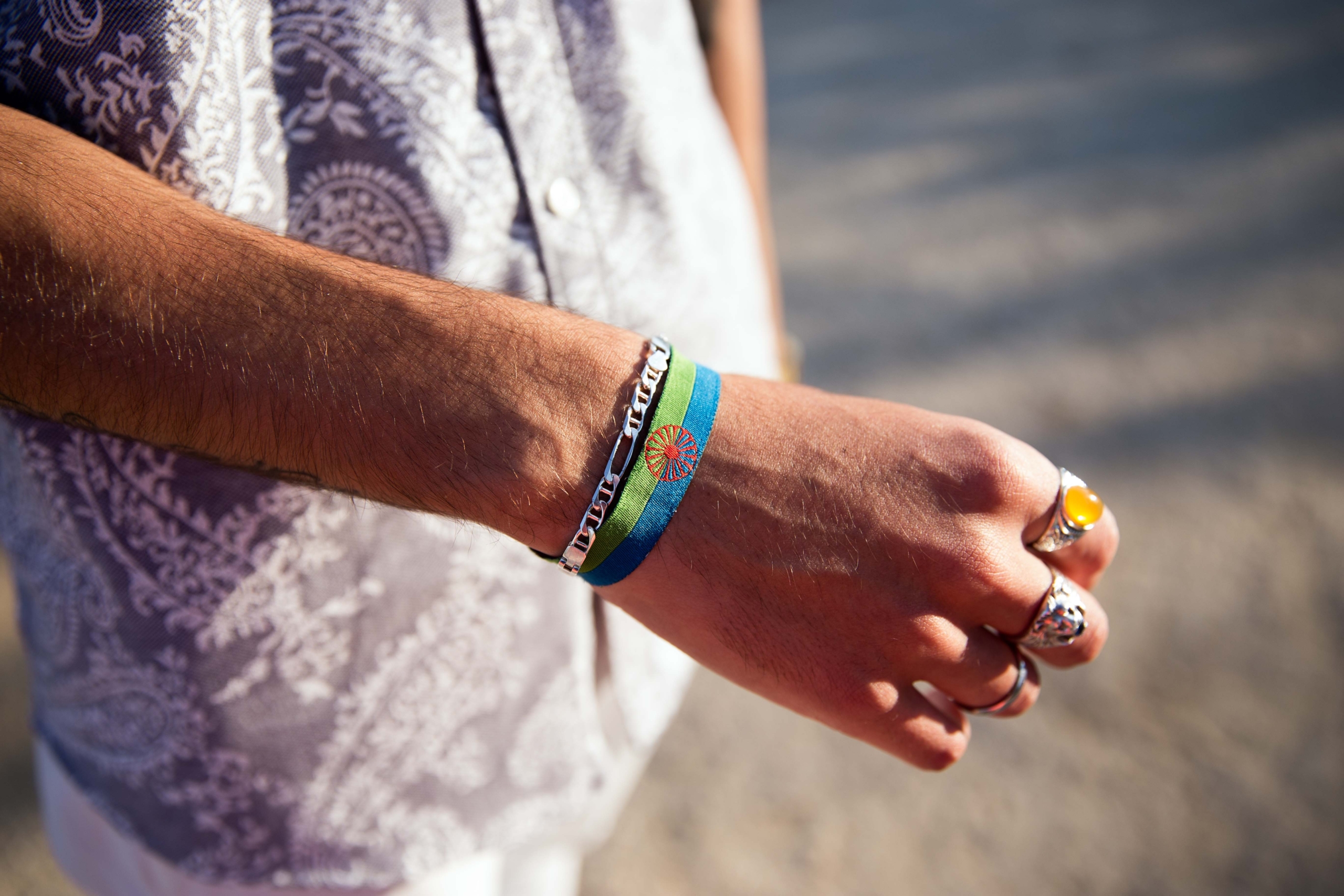
Daniel’s bracelet, reflecting the flag of the Romani people. Photo by Bex Wade. The media has a role in reinforcing these stereotypes. There are programmes on TV which feature Gypsies who are thieves and speak really coarsely, are workshy, who just love to dance and sing. The same five Gypsy families are the ones who appear on the TV, we all know them. They’re actually well educated, but they are like clowns for the masses. It’s a circus, confirming the stereotypes. There’s a show called ‘The Gypsy Kings’ – it makes me laugh too, but instead of portraying all the beautiful things about Gypsy culture, they choose the same old storylines. It would be so good if they could show the amazing diversity within the Gypsy community.
Just like any other community around the world, the Gypsy community is diverse. There are Gypsy teachers, Gypsies who work in laboratories, there are lesbian and gay Gypsies, there are Gypsies who sell melons, there are women Gypsies who feel they want to be men…diversity is normal. My Mum always taught me to value people for what they’re like, not what they are. I don’t want to judge anybody.
Many people who are highly religious would say that only God can judge us. I don’t consider myself a believer in a Christian sense. I believe in God, but not in the same way as others. Human values are more important than sacred texts, a good heart is so important.
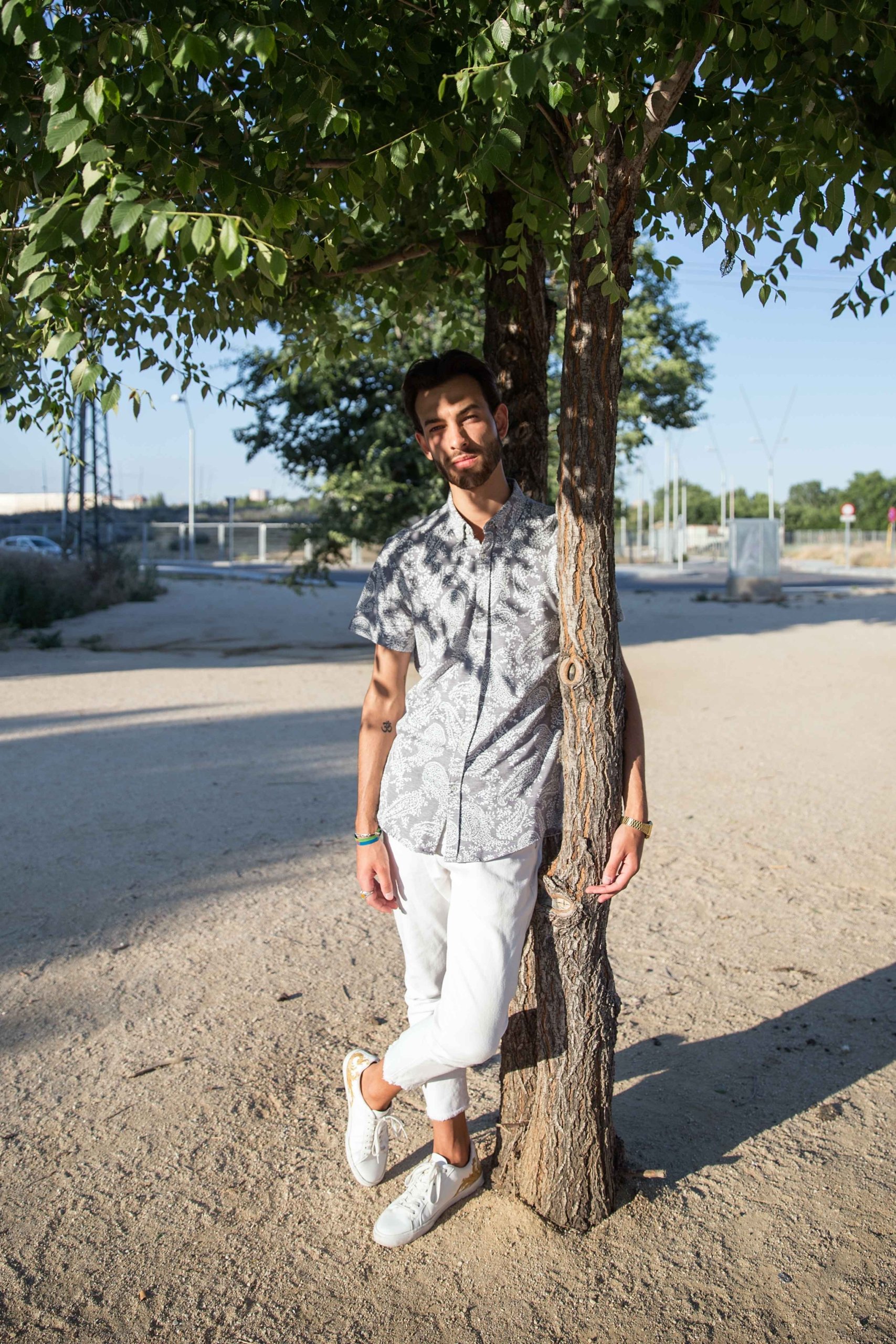
Daniel Janoher de Vargas. Photo by Bex Wade. If you’re born a certain way, who has the right to come and tell you how you should live your life? There are many people who are homophobic because of their religion, especially in some evangelical sects, it’s done a lot of harm to certain people. Dissidence from the norm in our community, in all of its aspects, is so, so important in order to show the world that diversity is present in Gypsy society, as it is everywhere.
I think that my generation, and the one that follows it, are the generations of change. My hope for the future is that there will be no need for someone like me to be sitting here talking to you about all of these so-called problems. I ask people to look deep in their hearts, that they look around them and learn, to not judge people until they know them a little better. The world is a beautiful and precious place, we’re here for something, and we need to do what we can.
-
Madrid’s Critical Pride protest – ‘Pride is transgression’
by Emma Eastwood
Madrid’s Critical Pride (Orgullo Crítico), is a series of events centred around a large demonstration held on 28 June, under the motto ‘Pride is transgression.’ According to its organizers, the movement was born out of a necessity to protest the commodification of the LGBT+ movement and return to the origins of Pride as a protest or revolt, rather than an event contributing to the growth of so-called ‘pink capitalism.’
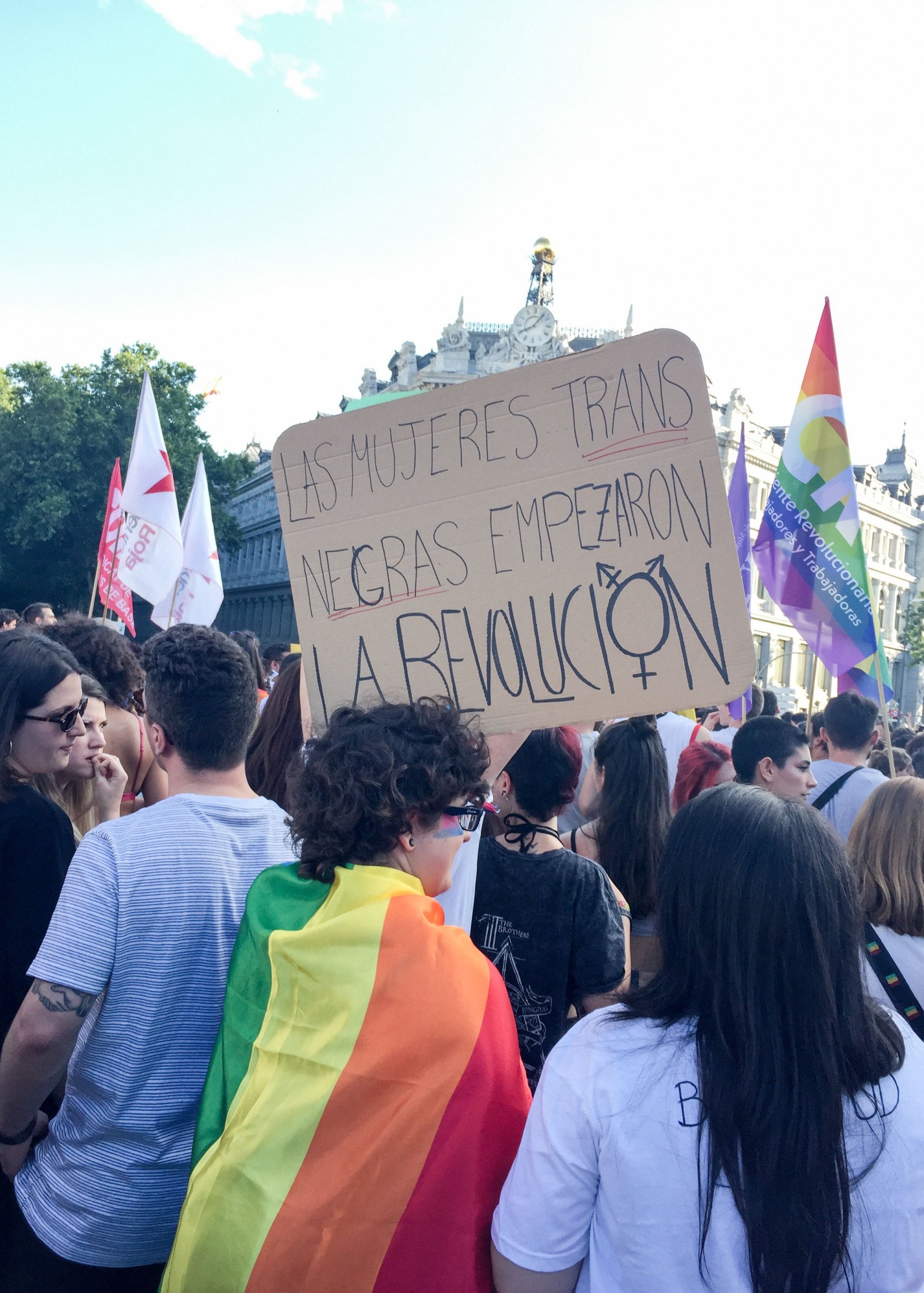
Critical Pride, 2018. Photo by Emma Eastwood. Critical Pride organisers claim that the principal protagonists of the massive mainstream Pride Parade, held a week later, are middle class Spanish, white, gay men, whose bodies also conform to a certain cis-gendered, muscular norm. The movement calls out Pride’s exclusion of marginalised groups, such as migrant, trans, sex workers, and, highlight how the realities of LGBT+ people intersect with other axes of oppression, such as class, ethnicity, poverty or physical traits and characteristics.
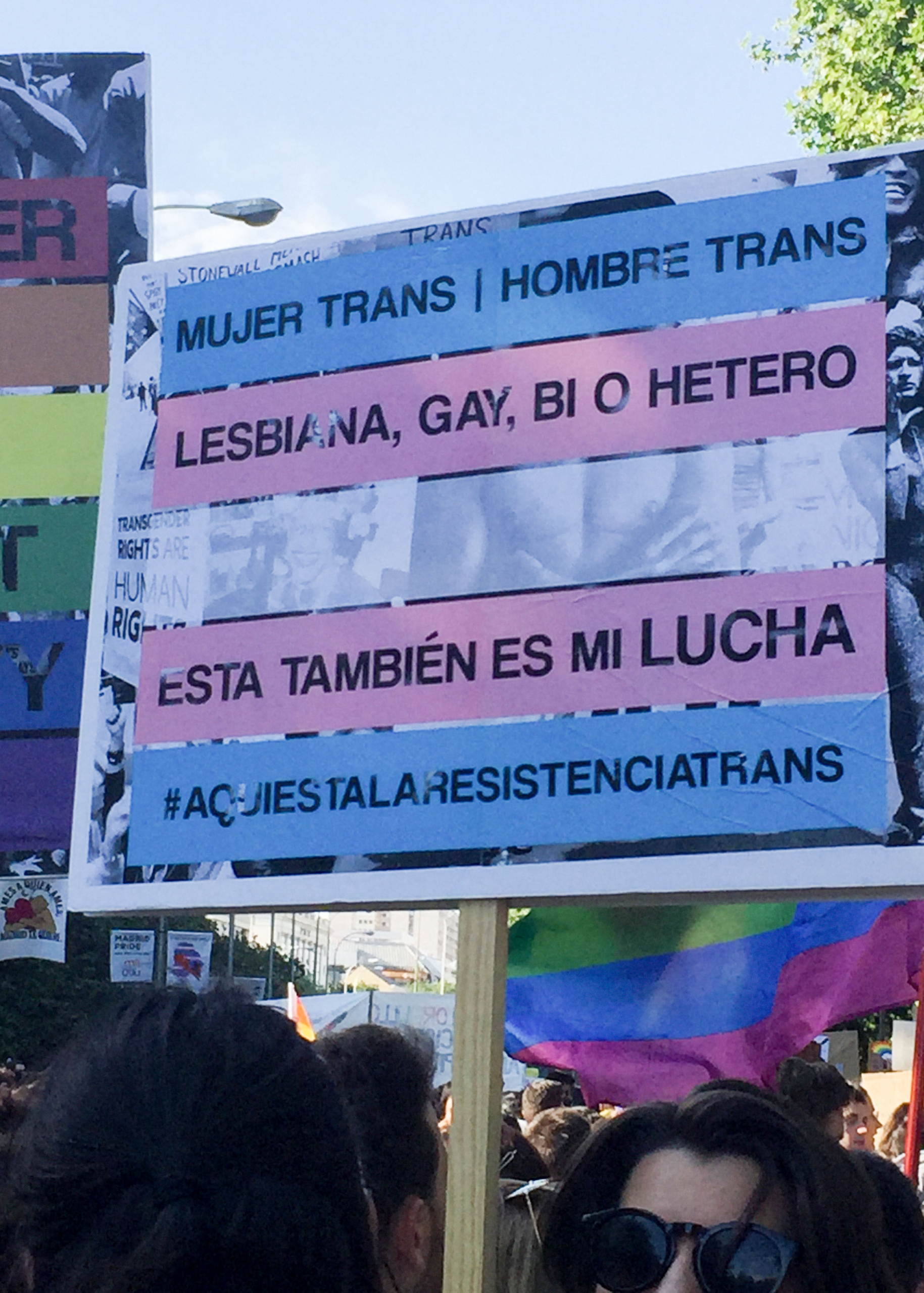
‘Trans women, Trans men, Lesbians, Gays, Bisexuals and Heterosexuals. This is also my fight. #TransResistanceIsHere.’ Photo by Emma Eastwood. Knowing that many LGBT+ Gypsies shun the mainstream Pride celebrations, we went along in June and asked some of the members of the group Ververipen – Rroms por la diversidad, a Spanish gypsy collective, why they were taking part in Critical Pride.
Fernando
‘I’m taking part in Critical Pride because it’s important that my voice, a Gypsy voice, is heard. But the Gypsy cause is not the only one I support. I support equal rights, equal opportunities, so I’m part of many movements.’
‘It’s really important to show that the Gypsy community is diverse, it’s different., it’s intersectional We have multiple identities, not only as Gypsies, but also as LGBT+ people. This rich diversity needs to be more visible.’
‘I prefer to participate in the Critical Pride march rather than the mainstream Parade, because this is more about visibility, and defending rights. It’s what most concerns me.’
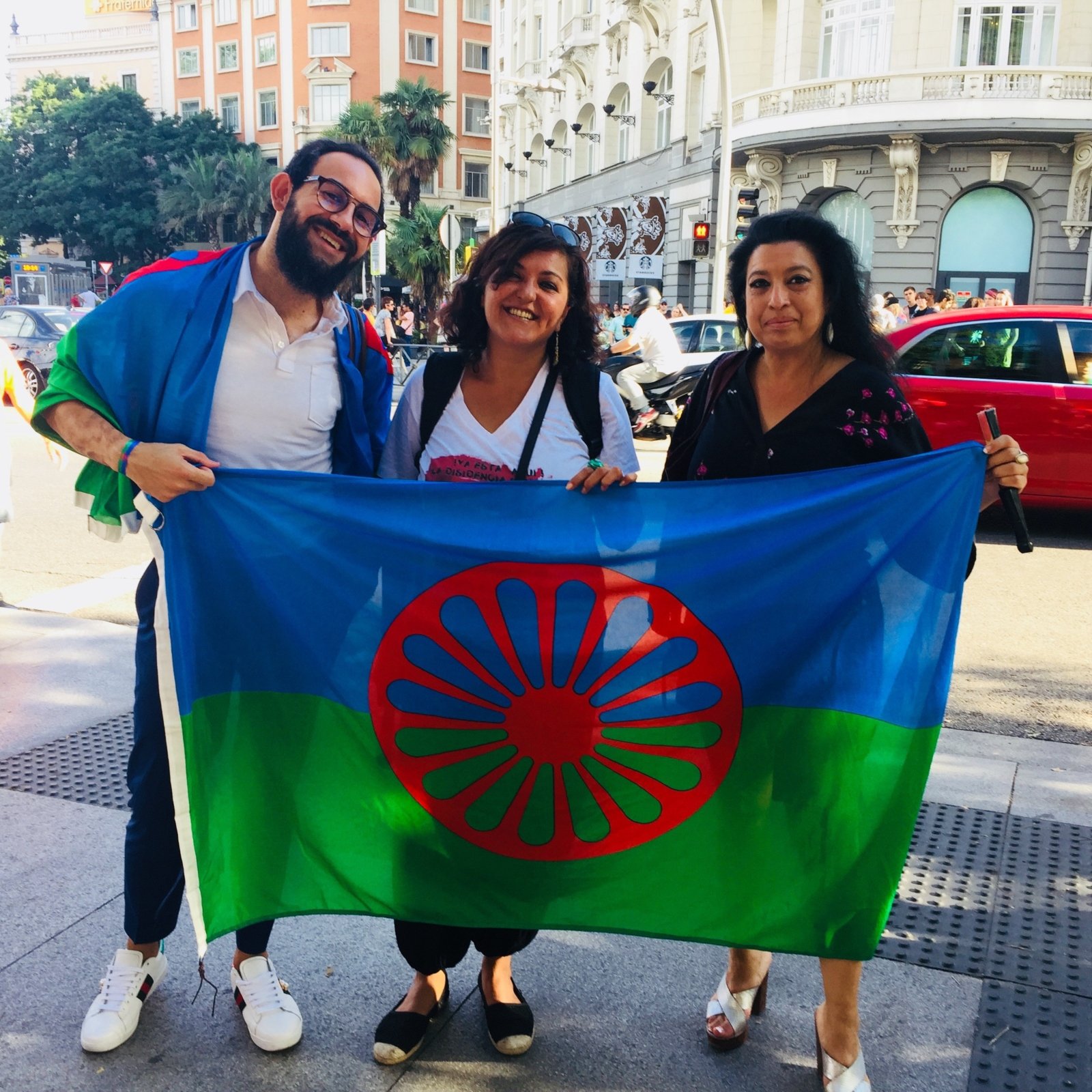
(L-R) Fernando, Celia and Aurora from Ververipen, a Spanish gypsy collective, taking part in the Critical Pride march. Photo by Emma Eastwood. Aurora
‘I’m here because mainstream Pride has become a spectacle; it’s all just about money. Last year was awful. The small organisations were invisible. The protagonists were all the big corporations. What about the organisations and activists who are out on the streets all year round trying to improve the situation for LGBT+ people?’
‘In general if you’re a Gypsy, or a black woman, or a Latina, a trans woman, well….your difference is visible all the time, like being inside a crystal ball. It’s a really complicated situation.’
‘I’m also part of Pride in the suburbs and peripheral neighbourhoods of Madrid. So that they also have some visibility. It’s not just all about the centre of Madrid.’
‘On Critical Pride, we’re all neighbours, we’re from the street, we all diverse. As it should be right? In mainstream Pride, the diversity is on the pavements watching, we’re not on show on the floats, or in the Parade at all.’
Celia
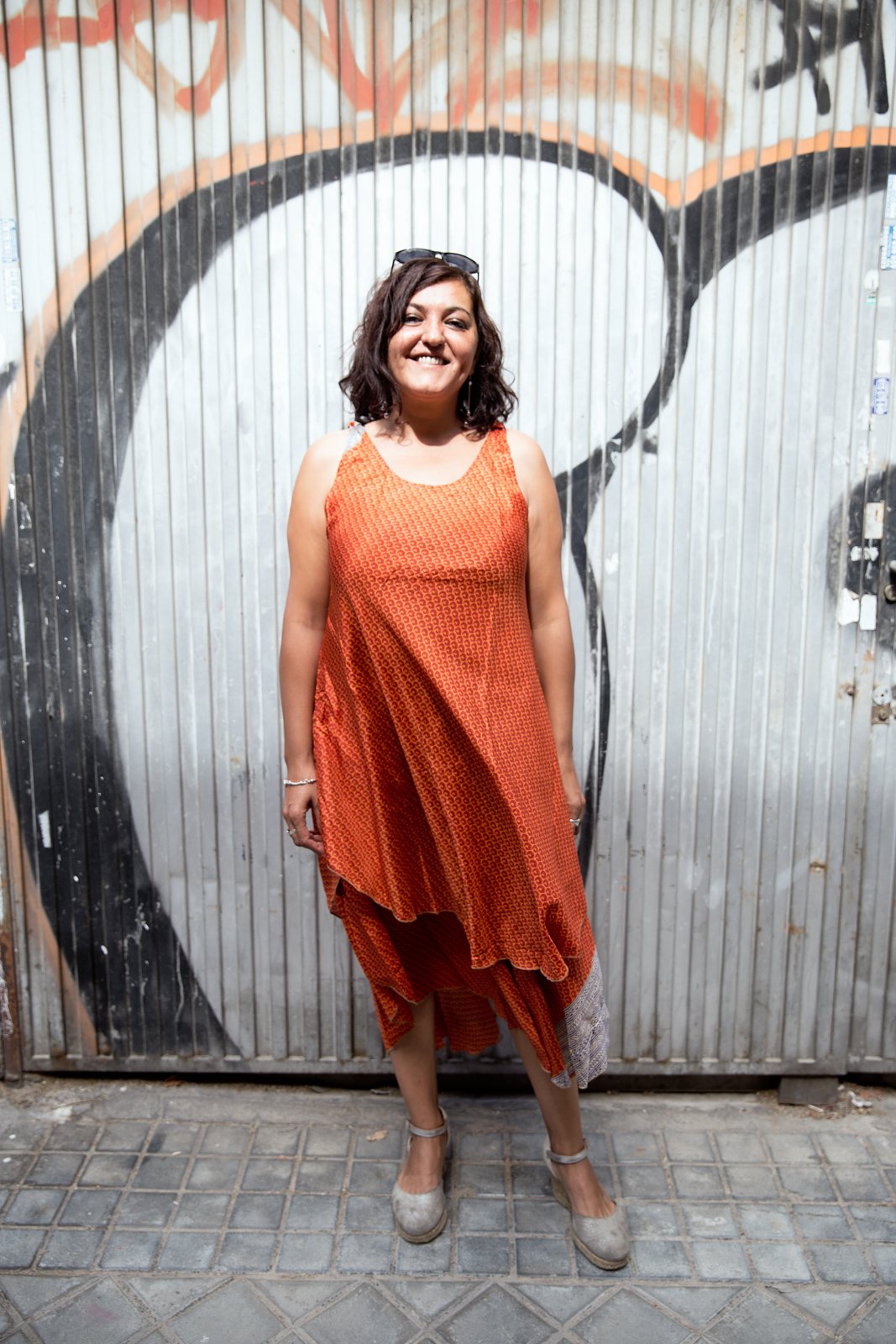
Celia Montoya from Ververipen, a Spanish gypsy collective. Photo by Bex Wade ‘We’re here because mainstream Pride, well it’s really commercial, full of stereotypes, stuck in the same old patterns. Whereas here at Critical Pride, we are claiming our rights, being visible.’
‘Gypsy sexual and gender dissidents need to be more visible. Not only to majority society, but also more visible in our own community. It makes sense for us to be taking part in Critical Pride, because we are marginalised by mainstream society, because it’s also an anti-capitalist march, there are working class people here…it’s our space, much more than the other Pride celebrations.’
The group gave us a copy of their 2018 Ververipen manifesto, which they hoped to read out at Critical Pride:
‘AMARE VERVERIPEN SI AMARE BARBALIPEN – Our diversity is our wealth.
This is our organization’s motto. We are Roma and Gadje people who fight for respect for diversity. We are against homogenization, colonization and intolerance, not only in majority society but also among our Roma people.
Roma sexual dissidents often face daily and multiple forms of discrimination and mistreatment. We are made invisible and it is difficult for us to achieve our goals of equity, respect and empowerment. We have been anonymised by LGBTphobia, silenced by the shame of our families or the invisibility of our Roma ethnicity. Sometimes we end up in an arranged marriage as an attempt to shut us up.
We are forgotten by the official and majoritarian sexual liberation movements. We face societal prejudices and stereotypes that confine us and limit us, and the rejection by important members of our own ethnic group. Your phobia of Roma and anti-gypsyism makes us invisible and can even kill us. Homophobia and false ethnic identity based on prejudices could be the end of us.
In Ververipen we claim our right to an inclusive, intersectional, decolonized, feminist, multiple and free Roma identity. One of the great values of our culture is freedom (Mestipen). We must be coherent with the values that we take pride in and make them worthy within our own communities too.
Our people are a diverse people. We are powerful as people because we live collectively. We have survived as a group because we both empathy for and defend those amongst us who are defenceless. The weakest link of our people are the ones who suffer multiple forms of discrimination, and we must protect them.
We are witnessing that in the sexual dissidence movements that have arisen in mainstream society, there is a dangerous surge towards right wing politics, homonationalism and neo-liberalism. They are prejudiced against all our tribes – the poor, ethnic minorities, stateless, political and economic refugees. If this is not stopped then all the years of speaking out for justice, the beatings, insults, murders and incarcerations, will have been in vain.
We also refuse to have our bodies and sexualities manipulated by mainstream society to justify their phobias. Their objective is to attack our group rather than to defend the rights of Roma sexual dissidents.
We do not want to stand against our allies. We seek to create a synergy based on equality, empathy and mutual respect. We want a mature form a solidarity between groups that will break with colonialism and offer a more intersectional vision of diversity.
Remember my people, NA SAN KOKORRÉ, you are not alone.
T’aves baxtale thaj na bistar, amare ververipen si amare barbalipen!! Opre Romano them, opre romalen.